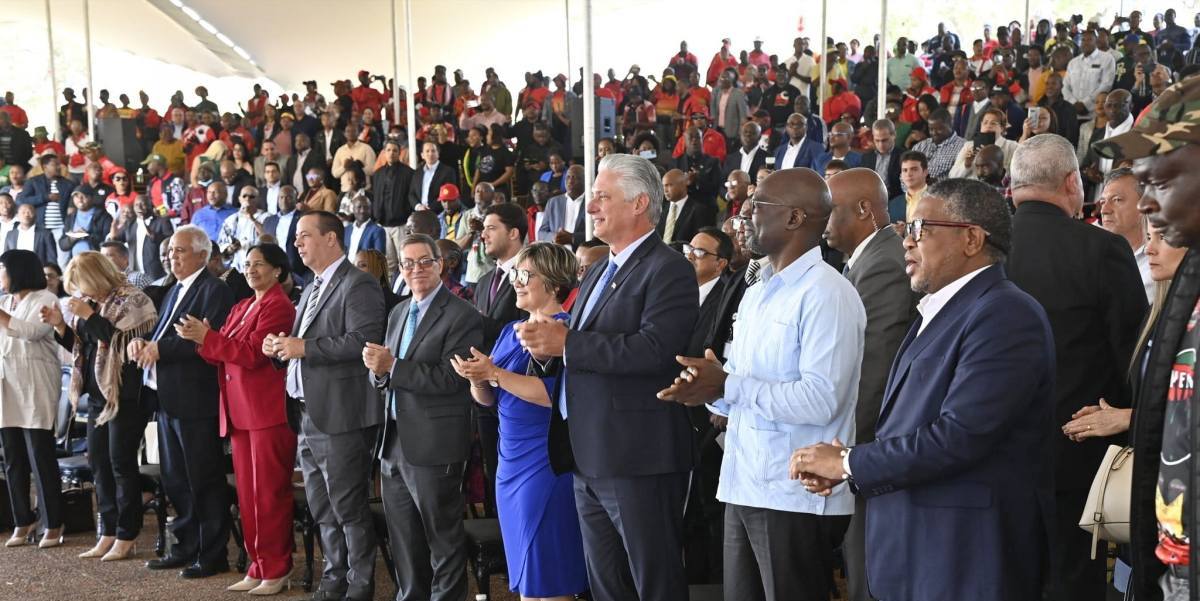No. 9
September 2023
All Out to Make Canada a Zone for Peace!
• Demand Canada Stay Out of U.S. War Preparations!
Escalating U.S. Threats in Asia Pacific and Related Developments
• U.S.-Japan-South Korea Camp David Summit
• Korean People Condemn Camp David Tripartite Agreement and Japan's Irresponsible Actions
• Self-Serving U.S. Agenda at Security Council Condemned
Japan's Release of
Radioactive Nuclear Wastewater into Pacific Ocean
• Japanese People and Peoples of Neighbouring Countries Strenuously Condemn This Move
Brazil, Russia, India,
China and South Africa (BRICS)
Gathering in South Africa
• Historic Summit Forges Unity in Favour
of Peaceful
Cooperation and Progress
Solidarity with Cuba Broadens
• Cuban President Receives Rousing Welcome in Africa
Hands Off Haiti!
• Kenyan Delegation Visits Haiti to
Prepare for
Foreign Intervention Force
Vietnam's National Day
• 78th Anniversary of Victory of August Revolution
All
Out to Make Canada a Zone for Peace!
Demand Canada Stay Out of U.S. War Preparations!
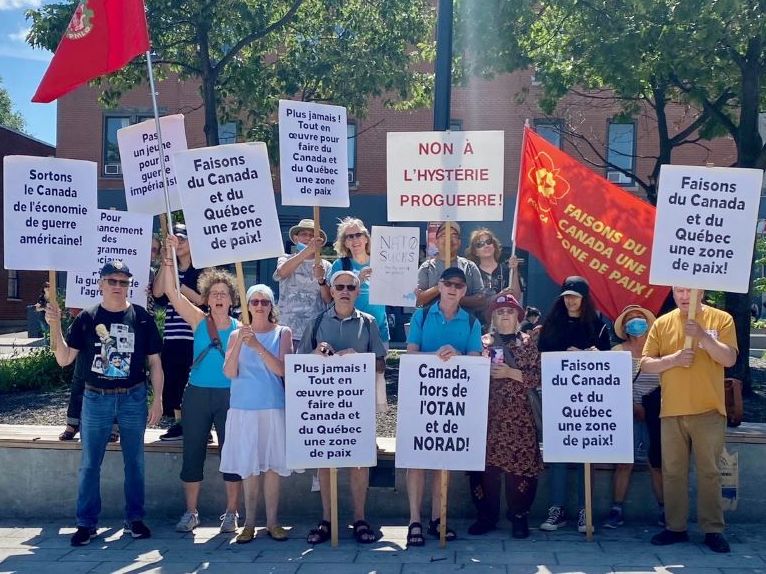
Hiroshima Day anti-war picket in
Montreal, August 6, 2023
The U.S. Bomber Task Force is currently conducting exercises to integrate other NATO forces into U.S. nuclear war preparations. According to reports, two B-2 Spirits also known as Stealth Bombers arrived in Keflavik, Iceland on August 24, to participate "with NATO allies in a Bomber Task Force Europe operation."
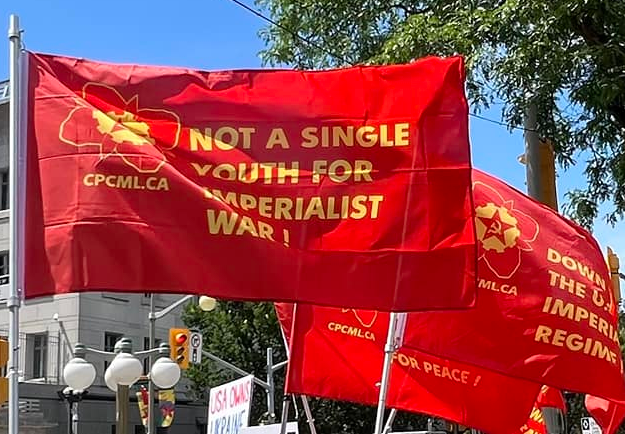 Stealth
Bombers under the control of the U.S. Air Force Global Strike Command
(AFGSC) are nuclear-capable strategic bombers featuring low-observable
stealth technology designed to penetrate dense anti-aircraft defences.
The AFGSC operates worldwide with some 33,700 military personnel. They
boast
on their website of being "Airmen providing strategic deterrence,
global strike and combat support ... anytime, anywhere! Innovative
leaders providing safe, secure and effective combat-ready forces for
nuclear and conventional global strike ... today and tomorrow!"
Stealth
Bombers under the control of the U.S. Air Force Global Strike Command
(AFGSC) are nuclear-capable strategic bombers featuring low-observable
stealth technology designed to penetrate dense anti-aircraft defences.
The AFGSC operates worldwide with some 33,700 military personnel. They
boast
on their website of being "Airmen providing strategic deterrence,
global strike and combat support ... anytime, anywhere! Innovative
leaders providing safe, secure and effective combat-ready forces for
nuclear and conventional global strike ... today and tomorrow!"
The U.S. describes and practices what it calls safe, secure and lethal "strategic deterrence," which in effect means constantly threatening both friends and foes alike with annihilation. It brandishes an annual war budget of one trillion dollars to finance modern weapons of extreme destructive capacity and to suck others into its war economy. It has hundreds of military bases worldwide and naval armadas constantly probing the defences of sovereign countries demanding one and all submit to U.S. dictate.
The Communist Party of Canada (Marxist-Leninist) calls on all those across the country who are determined to end the danger of war and secure the peace to discuss the developments taking place before our eyes. The times demand we speak out against Canada's integration into the U.S. war machine and economy. Canadians must not allow the government to make Canada a zone for war under U.S. command.
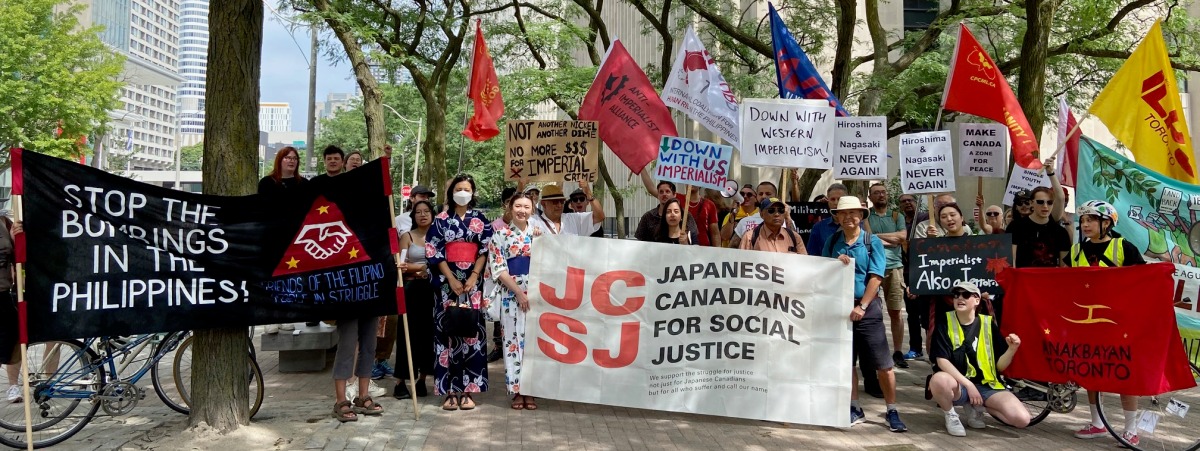
Rally in Toronto on
Hiroshima Day, August 6, 2023, opposes
Canada's integration into U.S. war machine.
Canadians must organize and speak out against the war hysteria of the ruling elite that the world is threatened with extinction because of the possible military superiority including nuclear of "the enemy." To prepare for war, they preach that interoperability of U.S./NATO forces must be perfected including the criminal plans and actions of the AFGSC to create a "strategic deterrence" to nuclear extinction.
The U.S./NATO war command claims that the aim of the current military exercise in Iceland "is to improve NATO forces' ability to integrate and enhance collective defence objectives, and to bolster their readiness to engage in a wide spectrum of military operations." The warmongers declare that peace is secured by wielding a nuclear threat of annihilation, which has been the U.S. approach to gaining global hegemony since it dropped atomic bombs on Japan in 1945 to terrify the world into submission.
 Faced
today with the refusal of the majority of the countries of the world to
come under U.S. dictate, the U.S./NATO forces are raising hysteria
about a threatened nuclear holocaust to frighten the people into
abandoning their sovereign right to be. Now is the time to discuss and
reject
warmongering and make Canada a zone for peace. The line of march of the
people towards peace, freedom and democracy is decisive to secure a
future without war.
Faced
today with the refusal of the majority of the countries of the world to
come under U.S. dictate, the U.S./NATO forces are raising hysteria
about a threatened nuclear holocaust to frighten the people into
abandoning their sovereign right to be. Now is the time to discuss and
reject
warmongering and make Canada a zone for peace. The line of march of the
people towards peace, freedom and democracy is decisive to secure a
future without war.
The people must and can make history by striving to empower themselves and take control over all decisions that affect their lives. This includes control over Canada's armed forces outside of any military alliances with the U.S. be it NATO or NORAD. This means control over Canada's resources so they do not feed the U.S. war machine, and control over the national and international political affairs of the country, renouncing the use of force to settle disagreements.
Canadians taking control over their lives want to make Canada a zone for peace. They are determined to return Canadian warships and armed forces to Canada and stop prowling the seven seas and engaging in war games provoking hatred, tensions and armed conflicts. Canadians empowering themselves see all humanity as one for mutual development and peace without hatred and war propaganda and designs on their lands, people and economies and interference in their internal affairs.
Speak Out Now Against Canada's
Participation in U.S./NATO Military
Exercises
Including Preparations for Nuclear War!
Canada
Out of NATO
and NORAD! Dismantle NATO and NORAD
Make Canada a Zone for Peace!
 Hiroshima Day picket in Vancouver,
August 6, 2023
Hiroshima Day picket in Vancouver,
August 6, 2023
Escalating
U.S. Threats in Asia Pacific and Related Developments
U.S.-Japan-South Korea Camp David Summit
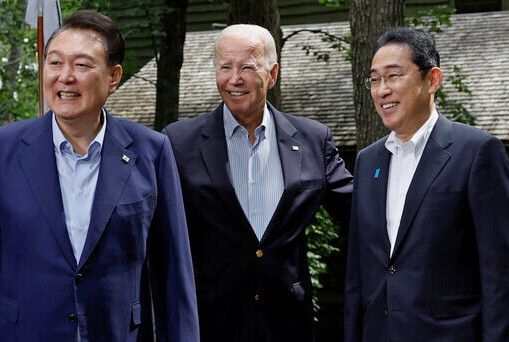 On August 18, the
warmongering Atlantic Council, which claims to be "a
nonpartisan organization that galvanizes U.S. leadership and engagement
in the world, in partnership with allies and partners, to shape
solutions to global challenges," was gleeful in its report of the
U.S.-Japan-south Korea
Summit held at the U.S. president's retreat, Camp David.
On August 18, the
warmongering Atlantic Council, which claims to be "a
nonpartisan organization that galvanizes U.S. leadership and engagement
in the world, in partnership with allies and partners, to shape
solutions to global challenges," was gleeful in its report of the
U.S.-Japan-south Korea
Summit held at the U.S. president's retreat, Camp David.
"U.S. President Joe Biden hosted the first-ever trilateral summit bringing together the leaders of the United States, Japan, and South Korea at Camp David in Maryland. Biden convened this summit with Japanese Prime Minister Fumio Kishida and South Korean President Yoon Suk Yeol to cement a common security agenda among the three countries to deter China and North Korea. The summit resulted in a joint statement dubbed 'The Spirit of Camp David,' as well as trilateral principles and a joint commitment to consult with one another on security threats," the Atlantic Council reported.
Political commentator Alexander Vorontsov in an article, "Reincarnation of the USA-Japan-South Korea Triangle," describes the outcome as "a qualitatively new and different phenomenon in the international arena, that is fundamentally different from the tripartite structure, about which several internationally-known experts have already written. There are indeed grounds for seeing a real transformation of the organization previously described in terms of a 'coalition structure' into a quasi-full-format military-political security pact." The documents issued at the Summit are extremely broad in scope and content, Vorontsov writes, saying that what is being set up requires a detailed analysis.
Setting out what he considers to be the main points, he notes that the U.S. considers the meeting itself and its results "an obvious and resounding success of U.S. diplomacy." Vorontsov writes: "Washington, with the same hard pressure as in Europe, where it prides itself on how quickly and effectively it mobilized and subordinated its NATO partners to a single allied will, is energetically 'lining up' its allies in East Asia as well." According to him, "in less than one year, the Biden administration managed to convince Japan and South Korea to put aside their perennial differences and focus on common threats formulated in American terms." An example of "perennial differences" is "the fact that both nations are considered America's primary allies in Asia-Pacific, (but) they struggle to even agree on the name of the sea between them."
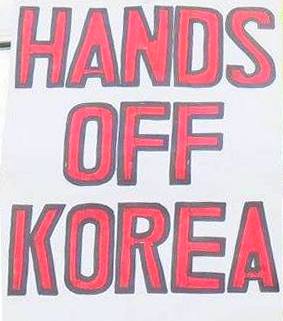 Vorontsov
writes, "One of the fundamentally important characteristics of
the new pact was that, if earlier it was considered as a non-primary
instrument intended exclusively for the Northeast Asian region with an
eye on North Korea, now its main mission has become global and defined
in
ensuring the strategic tasks of the U.S. allies throughout the
Indo-Pacific region." The document "The Spirit of Camp David" states:
"Our partnership is built not only for our peoples, but for the entire
Indo-Pacific region."
Vorontsov
writes, "One of the fundamentally important characteristics of
the new pact was that, if earlier it was considered as a non-primary
instrument intended exclusively for the Northeast Asian region with an
eye on North Korea, now its main mission has become global and defined
in
ensuring the strategic tasks of the U.S. allies throughout the
Indo-Pacific region." The document "The Spirit of Camp David" states:
"Our partnership is built not only for our peoples, but for the entire
Indo-Pacific region."
He points out that "Washington continues with indomitable energy to build a new global architecture of military-political alliances which are under its direct control, along the perimeter of the borders of Russia and China, uniting the security infrastructure from the Atlantic to the Pacific Ocean into a self-contained power infrastructure ... what we see already now 'on the ground.'" Vorontsov writes, "Washington at Camp David managed to tie Tokyo and Seoul closer to its strategic, primarily anti-Chinese agenda, overcoming hesitation, the desire not to quarrel with Beijing, both by Tokyo and, even more so, by Seoul. The White House managed to convince them to align themselves at a higher level with its strategic program."
Vorontsov adds: "Of course, in the summit documents, considerable attention was devoted to condemning the actions of the [Democratic People's Republic of Korea (DPRK)] and plans to neutralize its military capabilities, including the announcement of the creation of a new trilateral working group to intensify cooperation, together with the international community, to combat the cyber threats of the DPRK and block its cyber operations. The three countries have committed themselves to hold major joint military exercises at least once a year, as well as the summits, etc. [...] It is obvious that the latest demand for denuclearization, which is obviously unacceptable for Pyongyang, confirms the fact that the Troika has no plans or intentions to enter into a process of meaningful negotiations with the DPRK."
In summing up, Vorontsov emphasizes that "the main result of the summit, in our opinion, was a 'great leap' in the implementation of the U.S. strategy to create a unified military-political architecture from the Atlantic to the Pacific Ocean. In this case, we see the deep transformation of the U.S.-Japan-South Korea alliance and the relentless pursuit of its maximum institutionalization, which deserves to be a topic of independent research. The purpose of these actions is also clear -- to strengthen the military infrastructure in order to intensify the confrontation with the DPRK, China, and Russia."
For their part, "experts from NATO's Atlantic Council" -- fellows of the Scowcroft Center's Indo-Pacific Security Initiative -- note that the new administration in south Korea with a new approach to foreign policy and U.S. relations has "created a historic opportunity and the Biden administration has been right to seize it." At the same time they caution, "Amid the optimism of this achievement, it would be wise to recognize that such moments rarely last."
One expert, who is also an assistant professor at the University of Tokyo and an adjunct senior fellow at the Pacific Forum, writes that this "is not the first attempt by the United States, Japan, and South Korea to institutionalize trilateral cooperation" but, he concludes, "this time is different." He said that "the three leaders are attempting to push through in a top-down manner to institutionalize trilateral cooperation with a life cycle that is not dependent on particular administrations."
He says the three countries must now act decisively to "expand their operations beyond missile defence and anti-submarine warfare. Such areas might include intelligence, surveillance, and reconnaissance; naval mine warfare; cyber and electronic warfare; outer space; evacuation of one another's citizens; and logistics. Achieving this will require the formulation of trilateral strategies and seamless operational coordination. It will also require the establishment of a trilateral nuclear consultative group, regular drills and trilateral dispatchment of liaison officers, and efforts to ensure technical compatibility and interoperability."
Another of these experts, a former Japanese corporate executive and U.S. Department of State official, is quoted as saying the Summit was "a major effort to establish precedent." He said that "we can see strengthened cooperation and coordination across a truly impressive array of areas of mutual interests, starting with institutionalized annual trilateral meetings by leaders and cabinet members. The countries pledged to work together on promoting maritime security and economic security (including supply chain resilience)" and "combating North Korean cyber threats and sanctions evasion, cooperating on missile defence, and conducting trilateral military exercises."

Anti-war protest in
Japan, May 3, 2022
Another "NATO academic" is quoted saying: "Unlike some speculation that the trilateral statement on China and the Indo-Pacific would show only modest change given South Korea's position between the United States and China, the institutionalization and consolidation of trilateral economic security cooperation signal a new level of aligned values and commitments."
Another expert who has served 20 years with the U.S. military says, "It remains to be seen if this cooperation can lead to coordinating the group's unfettered access to high-end semiconductors when it needs them the most: during regional armed conflict.... [D]uring a regional conflict, the United States must maintain unfettered access to especially high-end semiconductors to ensure it is able to meet its security and defence article guarantees to Japan, South Korea, and Taiwan.... Although high-end semiconductor industry manufacturing giant TSMC and its competitor Samsung have pledged investments in new fabrication facilities abroad, they are likely to maintain the production of high-end chips and those facilities at home. As fabrication plants are specialized, a plant is unable to simply shift from producing low-end chips to high-end chips due to a crisis elsewhere. Thus, the joint statement announcing that the three will work together 'to launch early warning system pilots to expand information sharing and enhance policy coordination on possible disruptions to global supply chains' will be a significant step toward ensuring access to high-end chips during a crisis. But the three states, along with Taiwan, will need to work toward building flexibility in the supply chain."
An expert who is also with the Atlantic Council's China Hub added: "[The] growing tripartite cooperation between the United States, Japan, and South Korea for Southeast Asia and the Pacific Islands, both of which have become increasingly prominent arenas for geopolitical competition between the [People's Republic of China], the United States, and the latter's allies and partners -- Japan, South Korea, India, Australia, and more ... will help the United States, its allies, and partners make headway on their strategic goals and advance development and prosperity for Southeast Asia and the Pacific Islands."
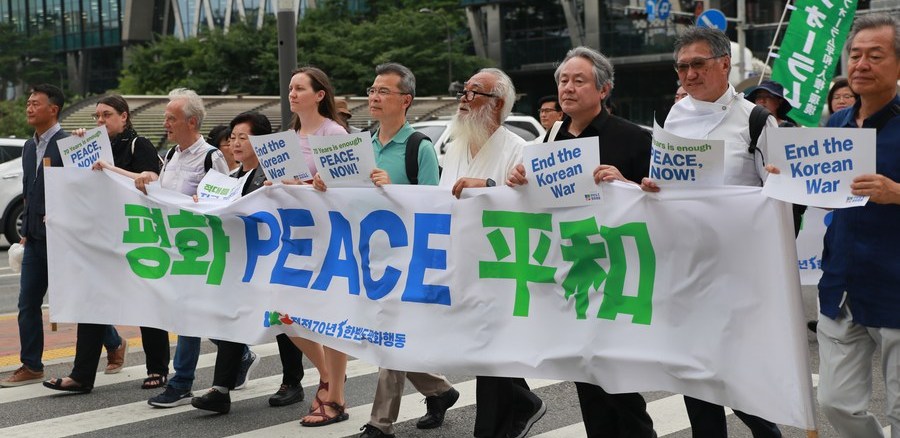
Demonstration
in Seoul, Korea on the occasion of the 70th anniversary of the signing
of the armistice that ended fighting in the Korean War, July 23, 2023.
The demand of the Korean people and the peoples of the world is for the U.S. to sign a permanent peace treaty with the DPRK, stop threatening them with nuclear holocaust, stop all aggressive military exercises which threaten the DPRK and the peoples of the entire region, stop its war preparations which consider the Taiwanese, Japanese, Korean and other peoples dispensable and for the U.S. troops, war ships, submarines and war planes to go home. Now is the time for the peoples of the world to unite in action and make themselves the decisive force to realize their striving for peace, freedom and democracy.
Korean People Condemn Camp David Tripartite Agreement and Japan's Irresponsible Actions
The Korean Central News Agency (KCNA), of the Democratic People's Republic of Korea (DPRK), reports that in the wake of the Camp David tripartite agreement between the U.S., Japan and the Republic of Korea (ROK) fierce struggle has broken out in all parts of south Korea for the resignation of Yoon Suk Yeol. He is called the "President traitor who is welcoming nuclear calamity by kowtowing to the United States and Japan." KCNA informs that the actions in south Korea also call for the abrogation of the tripartite alliance, an end to the war exercises and a stop to Japan's discharge of nuclear-polluted water into the sea.
People's Action and other labour, civic and public organizations held press conferences in Seoul and other places in the Republic of Korea to condemn the increased danger of nuclear war due to the war moves of the United States and the Yoon Suk Yeol regime. Actions also took place at the U.S. military bases in Taegu, Pusan and Kyonggi Province. They condemned the Camp David agreement for heightening the danger of nuclear war due to the largest-ever joint military exercises, conducted despite the strong opposition of the public at home and abroad.
In Seoul, Kwangju and South Jeolla Province, Solidarity for Sovereignty, the Students' Progressive Federation and other civic, public and environmental organizations held press conferences in front of government buildings and offices. The Seoul Situation Council for Judging the Yoon Suk Yeol Regime, the Pusan Movement Headquarters against Fukushima's Discharge of Nuclear-Polluted Water and other regional organizations from different sectors have staged protest actions every day.
The Korean Confederation of Trade Unions and organizations from various circles held a 72-hour emergency action demanding Japan's discharge of nuclear-polluted water into the sea be stopped. Staging a demonstration and sit-in, the Confederation warned that if the Yoon Suk Yeol regime does not check Japan's discharge of nuclear-polluted water, it would pay dearly.
Mass Protests Continue in Republic of Korea
In Seoul on September 2, the second all-people rally took place to protest Japan's discharge of nuclear-polluted water into the sea and to condemn the Yoon Suk Yeol regime. Attending the rally were more than 50,000 people, including members of the "joint action for checking Japan's discharge of nuclear-polluted water into the sea," the Progressive Federation of Students, the Minju Party and the Progressive Party. The protesters chanted such slogans as "Total ban to the import of Japan's marine products," "Stop the discharge of nuclear-polluted water from Fukushima into the sea at once" and "We condemn the Yoon Suk Yeol regime speaking for the Japanese government."
The International Atomic Energy Agency says the nuclear wastewater is safe and has issued scientific reports to that effect but there is a huge crisis of credibility and distrust about the science due to peoples' past experience with government measures, such as the lack of safety of the Fukushima Daiichi Nuclear Power Plant in the first place, which was built in a populated area susceptible to earthquakes and tsunamis, which caused much damage to peoples lives when struck by a quake and tsunami in 2011. The tsunami left more than 15,000 dead or missing. Some 41,000 people are still displaced, including more than 22,000 people who are unable to return to their homes due to the residual radiation.
Also in Seoul, the 55th candlelight rally took place on the theme of "impeaching Yoon Suk Yeol who has declared a war on the people." Newspaper accounts say that the opposition to Yoon for proactively promoting and supporting Japan's discharge of nuclear-polluted water sees him as a traitor. At the rally attended by tens of thousands of people including workers, farmers, university students, citizens and religious congregations, speakers denounced Yoon for declaring a war on the whole population to help Japan discharge the nuclear-polluted water. Its participants marched up to Kwanghwamun (the main and largest gate of Gyeongbokgung Palace) to Japanese and U.S. embassies, carrying the placards and posters with the slogans "Rejection of the West and Japan" and "Remove Yoon Suk Yeol from power" and chanting slogans "Oust Yoon Suk Yeol through all-people resistance," "Let us advance with candlelight," "Beat down the groups of traitors," etc.
In related news, more than 200,000 people held a large-scale rally called by the Korean Teachers and Education Workers Union outside the parliament building to protest the unjust education policy of the Yoon regime and demand the resignation President Yoon for his traitorous actions.
Yoon dismissed the protests as being incited by "communist totalitarian forces," their "opportunistic followers, and anti-state forces." He went on to accuse protestors of "inciting anti-Japanese sentiment and misrepresenting the cooperative arrangement we reached with the U.S. and Japan at Camp David as something that will endanger the Republic of Korea and the Korean people," going on to claim, "Our current freedoms are constantly under threat."
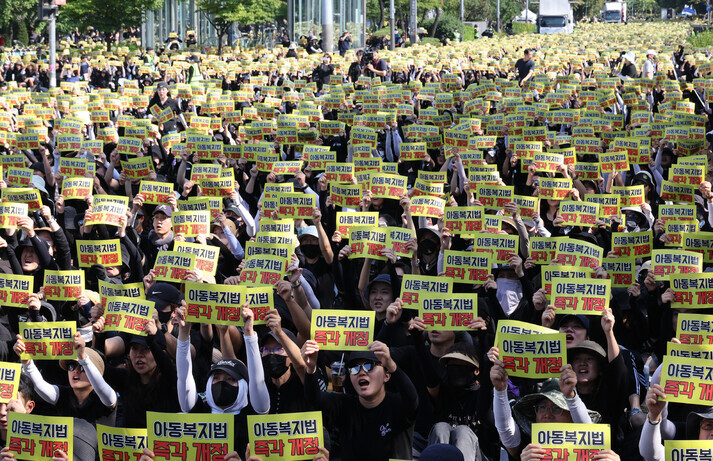
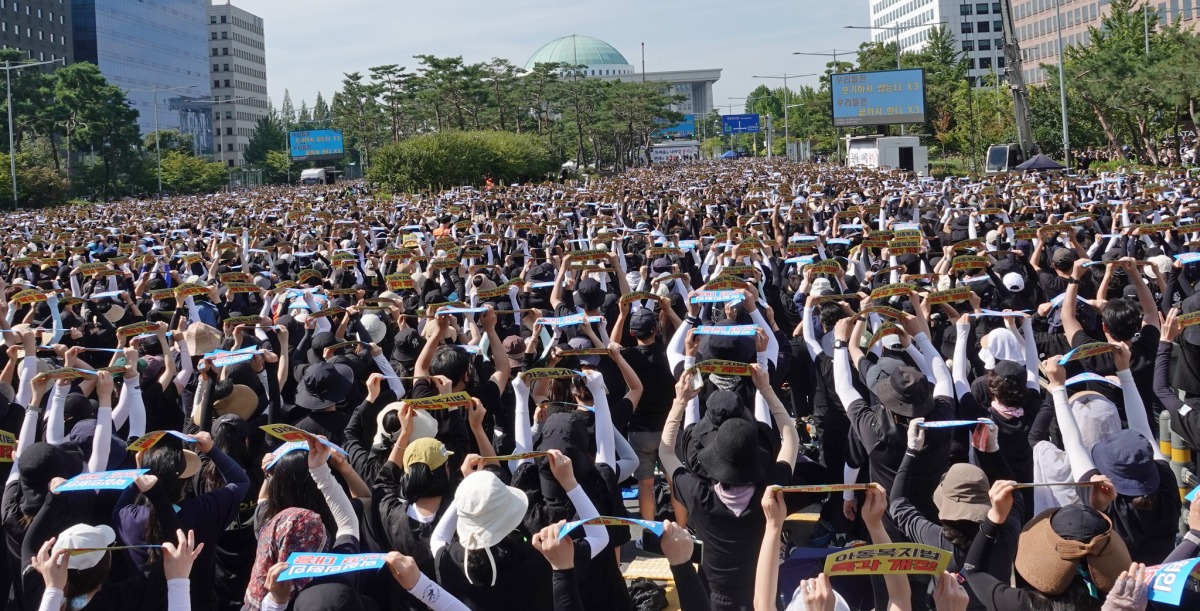
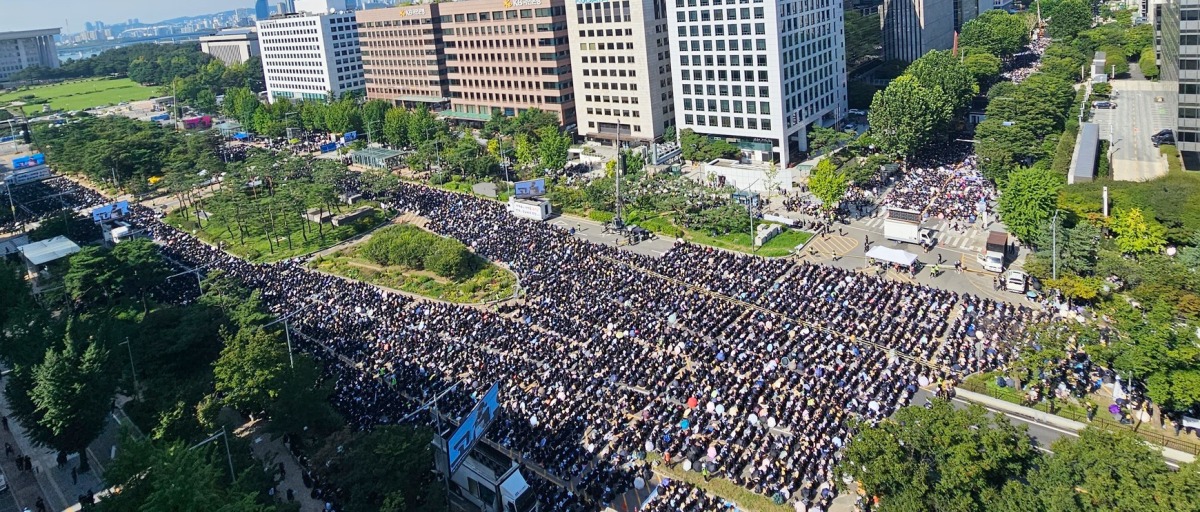 Teachers rally outside the
parliament building in Seoul, Korea, September 2, 2023
Teachers rally outside the
parliament building in Seoul, Korea, September 2, 2023
(Photos: Hankyoreh, Korean Teachers and Education Workers Union)
Self-Serving U.S. Agenda at Security Council Condemned
On August 25, at the United Nations Security Council (UNSC), the U.S. wrecking of institutions such as the UNSC in pushing a political agenda against the Democratic People's Republic of Korea (DPRK) was condemned. The Permanent Mission of the Russian Federation to the UNSC said that the "United States uses its President's seat in the Council this month to advance a narrow, self-serving, politicized agenda." The Russian Ambassador said, "This meeting is nothing more than a cynical and hypocritical attempt by the United States and its allies to increase pressure on Pyongyang and divert attention from the reckless escalatory actions of Washington and its allies in the region, which are the real source of threats to international peace and security."
The Ambassador pointed out that pressure on Pyongyang is not limited to purely military activity. Unfortunately, the platform of the UNSC has been used for that purpose too, he said. Another confirmation of this was the meeting held the previous week on the human rights situation in the DPRK, which was absolutely pointless from a practical point of view, the Ambassador said. In order to promote their biased agenda, the initiators of the meeting disregarded the mandate of the UNSC, which is not authorized to deal with human rights issues.
The Ambassador also rejected the harsh regime of sanctions against the DPRK, saying: " We are convinced that the policy of harsh restrictions has long exhausted itself. It fundamentally contradicts the tasks of restoring confidence, which should be the primary concern of the Security Council."
Japan's
Release of Radioactive Nuclear
Wastewater into Pacific Ocean
Japanese People and Peoples of Neighbouring Countries Strenuously Condemn This Move
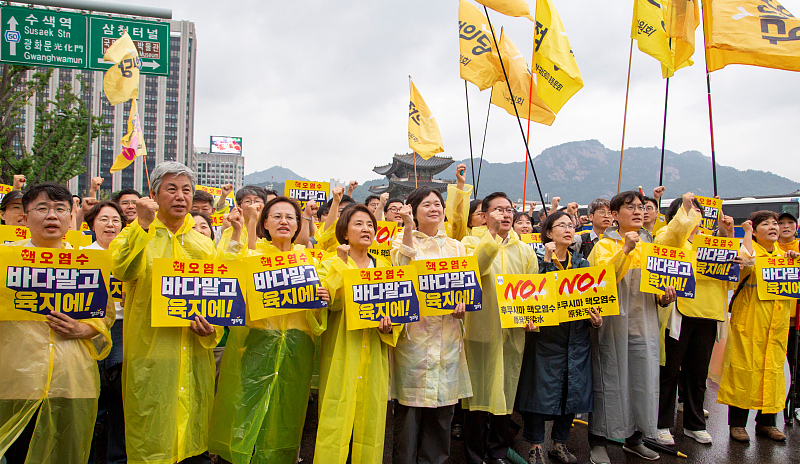
Protest in Seoul Korea
against dumping of radioactive water, July 15, 2023.
Despite widespread local and international opposition, the Japanese government and nuclear power monopoly Tokyo Electric Power Company (TEPCO) started releasing treated radioactive water from the wrecked Fukushima Daiichi nuclear power plant into the Pacific Ocean on August 23. The plant was crippled in an earthquake and subsequent tsunami in 2011.
The move was condemned by the Japanese people and by neighbouring countries. Fears of local fishing communities next to the plant that their years of work to convince consumers that Fukushima's seafood is safe would be wiped out have now come to pass.
The release of the radioactive water prompted China to announce an immediate blanket ban on all aquatic products from Japan. "By dumping the nuclear-contaminated water into the ocean, Japan is spreading huge risks to the rest of the world, and openly passing long-term harm onto future generations of humanity," China said. Japan exported about $600 million worth of aquatic products to China in 2022, making it the biggest market for Japanese exports, with Hong Kong second. Sales to China and Hong Kong accounted for 42 per cent of all Japanese aquatic exports in 2022, according to government data.
In Hong Kong, protestors declared, "Japan's actions in discharging contaminated water are very irresponsible, illegal, and immoral." They further stated, "No one can prove that the nuclear waste and materials are safe. They are completely unsafe."
In south Korea, police arrested at least 16 protesters who
entered the Japanese embassy in
Seoul, where they unfurled banners condemning both Japan and the
government of south
Korea for going along with this environmental crime. The students, who
belong to
organizations focused on social and environmental causes, including the
Peace Nabi Network
and Eco Action, held a rally where they chanted and held up signs.
Among the slogans were
"We condemn President Yoon for selling out public lives for election
fears," "The Korean
public opposes the release of contaminated water," and "You call
yourself the Korean
president yet you don't say a negative word about the contaminated
water."
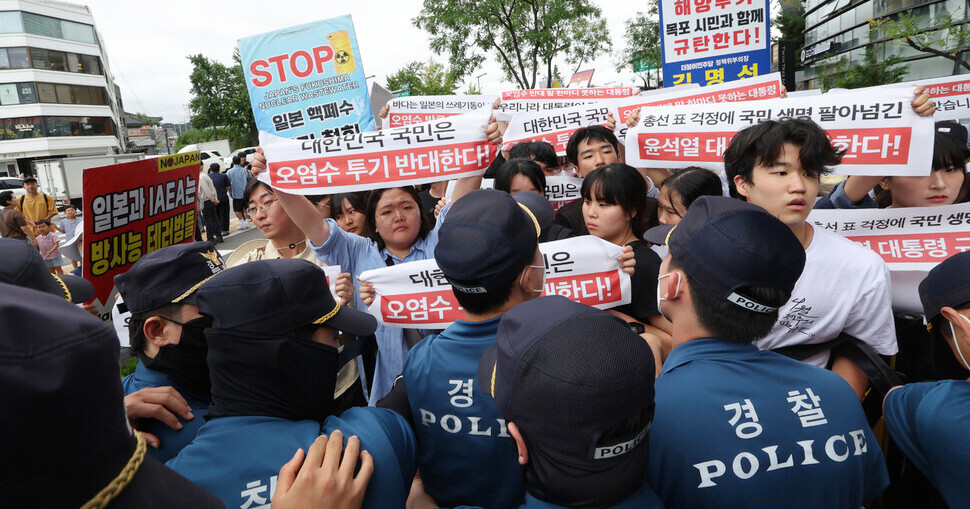
Protests
at Japanese embassy in Seoul, Korea, August 24, 2023 oppose
Japan's dumping of radioactive water.
The Ministry of Foreign Affairs of the Democratic People's Republic of Korea (DPRK) said, "The sea, the origin of living things and common wealth of humankind, is facing a serious crisis of nuclear pollution. The Japanese government decided to discharge nuclear-polluted water from the Fukushima Atomic Power Plant into the sea despite opposition and warnings of the international community."
In the Philippines, the fishers group Pambansang Lakas ng Kilusang Mamamalakayang Pilipinas (Pamalakaya) said in a statement that the treated wastewater from the nuclear power plant could reach and contaminate the marine resources and biodiversity of the Philippines' eastern archipelago. Pamalakaya said discharging the wastewater into the Pacific Ocean might pose long-term and drastic consequences to domestic fisheries' production and the abundant marine biodiversity. "We demand the Japanese government stop this environmental catastrophe in the making, and instead find alternative ways to dispose of their nuclear waste elsewhere," the group asserted.
Local Japanese fishers and the National Federation of Fisheries Co-operative Associations (JF Zengyoren) has led a broad coalition seeking an alternative method to deal with the problem, to no avail. International voices demanding another solution rather than polluting the ocean came from China, the DPRK, the Republic of Korea and the Pacific Islands Forum, which said it had "grave concerns." Environmental groups challenged the Japanese government's claims that the water will not affect marine life or human health. The U.S. National Association of Marine Laboratories pointed to a lack of adequate and accurate scientific data to support the Japanese government's reassurances on safety.
 Protest
in Fukushima against release of contaminated water, April 14, 2023
Protest
in Fukushima against release of contaminated water, April 14, 2023
The Japanese government's action also violates its 2015 written commitment to the JF Zengyoren, Fukushima fishers' cooperatives, the Fukushima Prefectural Assembly and most of the local assemblies in Fukushima, in which it promised "not to dispose of radioactive Fukushima water without obtaining the understanding of all concerned parties." Such an understanding was never reached.
Zhang Kejian, Chairperson of China Atomic Energy Authority, speaking at an International Atomic Energy Agency board of governors' meeting in June in Vienna, stressed that the amount of nuclear-contaminated wastewater from the plant is significant, and the composition is complex and the disposal period is an unprecedented length. According to Zhang, no effective technology exists to treat the number of nuclides to be released. Some long-lived nuclides may diffuse with ocean currents, which will bring unpredictable impacts on marine ecology and human health. For Japan to push forward with the discharge of contaminated water without verifying the long-term reliability of relevant technology and purification equipment and in addition attempt to cover up the danger is "unacceptable," Zhang noted in conclusion.
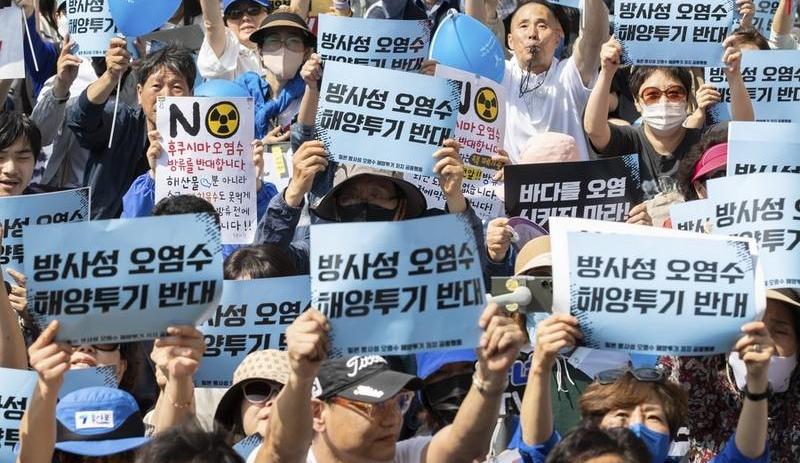 Protest in Seoul, Korea, May 20,
2023
Protest in Seoul, Korea, May 20,
2023
Expediency Created Conditions for Disaster
Further tainting the situation is the realization that expediency on cost has governed TEPCO and the government right from the beginning of the Fukushima Daiichi nuclear power plant and electric power production generally. Most electric power production throughout Japan comes from nuclear or coal-fired plants. Necessary electrical infrastructure has been deemed from the beginning to be provided at the lowest cost to industrial consumers. Since the widespread privatization of the infrastructure for power production, maximum profit for the private producers has further increased expediency over any principles.
The Fukushima Daiichi nuclear plant is located in one of the most active earthquake zones in the world with an ancient and current record of large tsunamis. In addition, earthquakes as far away as Chile across the ocean have generated frequent destructive tsunamis along the Japanese Pacific coast. Despite this scientific record and knowledge not only was the nuclear power plant built on top of an active earthquake zone but at sea level as can be seen in the photo below. TEPCO and the government explain this decision with the typical pragmatic response that water is needed to cool the reactors and the cheapest location is next to the sea.
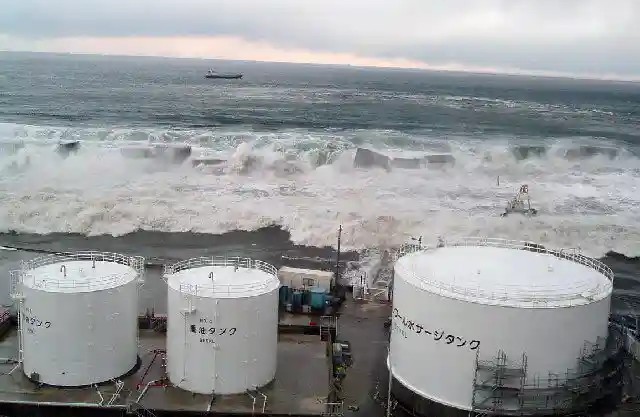
TEPCO file
photo shows the 2011 tsunami surge approaching the
sea-level Fukushima Daiichi nuclear plant.
The reactor buildings at the Fukushima power plant were damaged by hydrogen explosions caused by the nearby 9.2 magnitude earthquake in 2011 with the subsequent tsunami knocking out the cooling systems to the reactors with three of them suffering meltdowns. To contain the situation from becoming worse and prepare for decommissioning of the entire plant, more than 1.3 million tonnes of water have been used to cool the three crippled reactors.
Upon cooling the reactors and radioactive debris scattered throughout the basement of the plant, the water itself becomes contaminated. The radioactive wastewater is treated in a filtration system, which cannot remove all the harmful elements specifically tritium. The tritium contaminated water is then stored in tanks on site. TEPCO says this method will continue for at least 40 years until decommissioning and cleanup are complete. Meanwhile the tanks holding contaminated water on site are almost full and occupy all available space in the location and no alternative to dumping the water in the ocean exists according to TEPCO as every day brings more contaminated water to store.
How to dispose of radioactive waste looms over nuclear power production as an unsolved problem. At present, most of the dangerous waste is stored for disposal by future generations and advances in science. Japan has limited areas where radioactive waste can be safely stored such as underground because of the prevalence of earthquakes. TEPCO, other monopolies and the government have sought to pay countries including Canada to accept Japan's nuclear waste.[1] Not investing in finding solutions to this problem is another aspect of the expediency on price of production that governs the imperialists and their central aim of generating not social product for the good of all including the natural environment but maximum money profit for private enterprise.
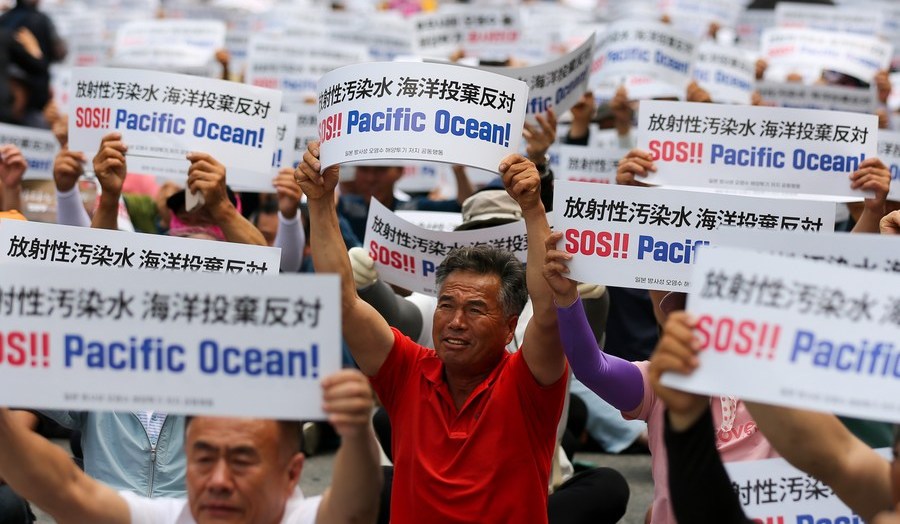 Seoul, June 12, 2023
Seoul, June 12, 2023
Note
1. See "Revelations about Secret Negotiations to Import Radioactive Waste into Canada from Japan," Workers' Forum, April 16, 2021.
Brazil, Russia, India, China and South Africa
(BRICS)
Gathering in South Africa
Historic Summit Forges Unity in
Favour of
Peaceful Cooperation and
Progress
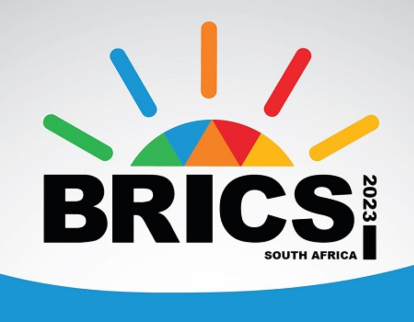 From August 22 to
24, the BRICS group -- comprising Brazil, Russia,
India, China and South Africa -- held its 15th annual heads of state
and government summit in Johannesburg, South Africa under the theme:
"BRICS and Africa: Partnership for Mutually Accelerated Growth,
Sustainable
Development and Inclusive Multilateralism." South Africa is the Chair
of BRICS for 2023 and the summit was hosted by South African President
Cyril Ramaphosa. This is the first in-person summit since 2019.
From August 22 to
24, the BRICS group -- comprising Brazil, Russia,
India, China and South Africa -- held its 15th annual heads of state
and government summit in Johannesburg, South Africa under the theme:
"BRICS and Africa: Partnership for Mutually Accelerated Growth,
Sustainable
Development and Inclusive Multilateralism." South Africa is the Chair
of BRICS for 2023 and the summit was hosted by South African President
Cyril Ramaphosa. This is the first in-person summit since 2019.
Representing the member countries were President of Brazil Luiz Inácio "Lula" da Silva, President of China Xi Jinping, South African President Cyril Ramaphosa, Prime Minister of India Narendra Modi and Russia's Foreign Minister Sergei Lavrov. President of the Russian Federation Vladimir Putin participated virtually. Also invited were representatives of the African Union, Arab Maghreb Union, Organisation of Islamic Cooperation, the Association of Southeast Asian Nations and the United Nations. Representatives of 60 other countries were present at the summit. The breadth of international participation was a new and notable feature for this year's summit.
In his welcoming remarks, President Ramaphosa pointed out that BRICS stands for solidarity and progress, for inclusivity and a more just, equitable world order and for sustainable development. He said that during its Chairship of BRICS, advancing the African agenda is a strategic priority for his country as reflected in the theme of this year's summit. He said, "Our objectives are reciprocal trade and investment. We want the goods, products and services from Africa to compete on an equal footing in the global economy. The African Continental Free Trade Area, once fully operational, will unlock the benefits of the continental market and generate mutually beneficial opportunities for both African and BRICS countries."
The main agenda item for this year's summit was the expansion of BRICS, which was successfully accomplished. South African Foreign Minister Naledi Pandor announced following the first day of meetings that BRICS leaders had adopted a document enshrining guidelines and principles of the association's expansion. "We have agreed on the matter of expansion. We have a document that we've adopted which sets out guidelines and principles, processes for considering countries that wish to become members of BRICS." A proposal by Indian Prime Minister Modi that admission criteria include require that members not be the target of international sanctions was not adopted. This would have ruled out Iran, Venezuela, Cuba and many others.
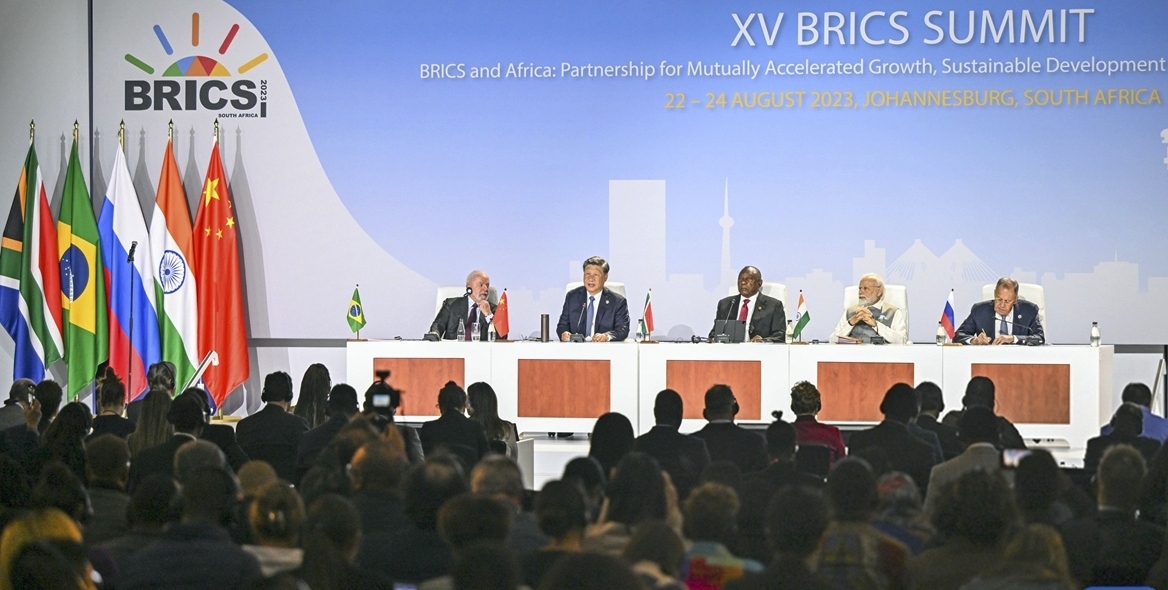
Argentina, Egypt, Ethiopia, Iran, Saudi Arabia and the United Arab Emirates were accepted as members at this summit, effective January 1, 2024. BRICS foreign ministers were also instructed to draw up a further list of likely partner countries, to be presented at the next summit in 2024.
Sixteen other countries have formally applied to join BRICS – Algeria, Bahrain, Bangladesh, Belarus, Bolivia, Cuba, Honduras, Indonesia, Kazakhstan, Kuwait, Nigeria, Palestine, Senegal, Thailand, Venezuela and Vietnam. Other countries that have expressed interest in joining include Afghanistan, Angola, Comoros, DR Congo, Gabon, Greece, Guinea-Bissau, Mexico, Morocco, Nicaragua, Pakistan, Sudan, Syria, Tajikistan, Tunisia, Turkiye, Uganda, and Zimbabwe.
Much discussion was devoted to economic issues and cooperation, as reflected in the 94-point final declaration of the summit. The final declaration of the BRICS 2023 Summit outlines the outcome of the discussions grouped into six themes: Partnership for Inclusive Multilateralism, Fostering and Environment of Peace and Development, Partnership for Mutually Accelerated Growth, Partnership for Sustainable Development, Deepening People-to-People Exchanges, and Institutional Development.[1]
Strengthening macroeconomic coordination and deepening
economic cooperation was reaffirmed and plans were announced to enhance
cooperation in agriculture to ensure food security. (BRICS countries
account for a third of the world's food production.) The final
declaration advocates continued expansion of the use of national
currencies in trade and financial transactions between the countries of
the association, to lessen dependence on the U.S. dollar. This follows
on the work of the 14th BRICS Summit in June 2022, where Russia's
proposal to create a new reserve currency based on a basket currencies
of its member countries was adopted. The final declaration also
rejected barriers to trade, including those imposed by a number of
developed countries under the pretext of combating climate change. The
Ukraine conflict was mentioned to note with appreciation the "mediation
proposals" aimed at a peace settlement of the Ukrainian crisis,
including an African peacekeeping mission.
The BRICS members, in their final declaration, reaffirmed their commitment to Multilateralism and international law with the UN seen as a cornerstone of the system of international relations. At the same time they called for reform of the UN, with wider representation of the developing countries in particular in the Security Council, and that World Trade Organization and Bretton Woods financial institutions, including the International Monetary Fund, should also all be reformed to better reflect the interests of the nations and peoples of the world. The BRICS Summit also committed to a balanced approach aimed at strengthening and integrating the voice of those countries that make up the so-called Global South into the G20 agenda during the Indian presidency in 2023 and the Brazilian and South African presidencies in 2024 and 2025.
On the final day of the summit, UN Secretary-General Antonio Guterres "echoed BRICS' longstanding calls for reforms of the UN Security Council, International Monetary Fund and World Bank," Reuters reported. Guterres said, "Today's global governance structures reflect yesterday's world. For multilateral institutions to remain truly universal, they must reform to reflect today's power and economic realities."
Cuban President Miguel Díaz-Canel, in his capacity as rotating president of the G77+China, addressed the summit on its final day. He referred to BRICS as "an integration mechanism that opens hopes for the strengthening of multilateralism, which today is as urgent as it is essential for the very destiny of Humanity." He went on:
"I attend this dialogue with the enormous responsibility that it represents for Cuba to chair the Group of 77 and China, the broadest and most diverse grouping of developing nations." We are 134 countries, he recalled, two thirds of the members of the UN, where almost 80 percent of the planet's population lives, facing the colossal challenges of an increasingly unequal world, where exclusion and poverty have multiplied after two years of pandemic, followed by dramatic conflicts. The G77+China and BRICS, said Díaz-Canel, together have the responsibility and the possibility to act for a change in the current unjust world order. 'It is not an option; it is the only alternative," he stressed.
The Cuban president recalled how the real transformation of the current international financial architecture, which he described as deeply unjust, anachronistic and dysfunctional, is a historical demand of both the G77+China and BRICS. He stressed that the New Development Bank created by BRICS can and should become an alternative to the current financial institutions, which have imposed for almost a century, draconian recipes to profit from the reserves of the Global South and reproduce their schemes of subjugation and domination. The extension of this mechanism based on broad-based foreign currency reserves, can guarantee certainty and stability to the Global South and would contribute to alleviate the imbalances of the current monetary system. The establishment of mutual lines of credit in local currencies by the banks of the BRICS nations and the possibility of creating a single currency for their operations, he added, are also initiatives that could be applied in relations with other developing countries. This could reduce the abusive monopoly of the U.S. dollar as the global reserve currency, which reinforces and guarantees a hegemony harmful to the rest of the world, Díaz-Canel stressed.
Regarding science and technology, he called for effective coordination between the BRICS and the G77+China, to safeguard the principle of common but differentiated responsibilities in the implementation of the Framework Convention and the Paris Agreement and for G77+China and the BRICS to break the monopoly by a club of countries that control most of the patents, technologies, research centers, and drain the talent from our countries. On this issue, he said, Cuba has called for a Summit of Heads of State and Government of the Group of 77 and China on science, technology and innovation as a premise for development, to be held next September in Havana.
Díaz-Canel concluded: "We firmly believe in the power of unity in diversity and that it is time to act together in defense of historic grievances that, because they have not been addressed in time, have multiplied the problems facing our nations today. To move towards a more just and sustainable future, the time for collective action is not tomorrow. It is now."
President Ramaphosa addressed the outcomes of the summit in his remarks that closed the event. He stated that leading up to the Summit, there was a wide-ranging BRICS business program aimed at attracting investment, promoting collaboration and showcasing opportunities within South Africa, Africa and BRICS countries. "We welcome the clear vision of Ms. Dilma Rousseff as the President of the New Development Bank on the role that the Bank should play in support of infrastructure and sustainable development in Africa and the Global South. We celebrated the 10th anniversary of the establishment of the BRICS Business Council and welcomed the self-review by the Council and the subsequent recommendations made to Leaders," he said. "We addressed our expectations for the BRICS economic partnership to generate tangible benefits for our communities and deliver viable solutions for common challenges faced by the Global South. We shared our vision of BRICS as a champion of the needs and concerns of the peoples of the Global South. These include the need for beneficial economic growth, sustainable development and reform of multilateral systems. We reiterate our commitment to inclusive multilateralism and upholding international law, including the purposes and principles enshrined in the United Nations Charter."
Ramaphosa said that BRICS recognizes that there is global momentum for the use of local currencies, alternative financial arrangements and alternative payment systems and is ready to explore opportunities for improving the stability, reliability and fairness of the global financial architecture. The summit, he said, agreed to task the BRICS Finance Ministers and/or Central Bank Governors, as appropriate, to consider the issue of local currencies, payment instruments and platforms and report back to the BRICS leaders by the next summit.
Regarding the expansion of BRICS, Ramaphosa said, "BRICS itself is a diverse group of nations. It is an equal partnership of countries that have differing views but have a shared vision for a better world."
The Chair of the BRICS passes to Russia in 2024 and the next BRICS Summit will be held in the city of Kazan, Russia.
Note
1.To read the full declaration click here.
Solidarity with Cuba Broadens
Cuban President Receives Rousing
Welcome in Africa
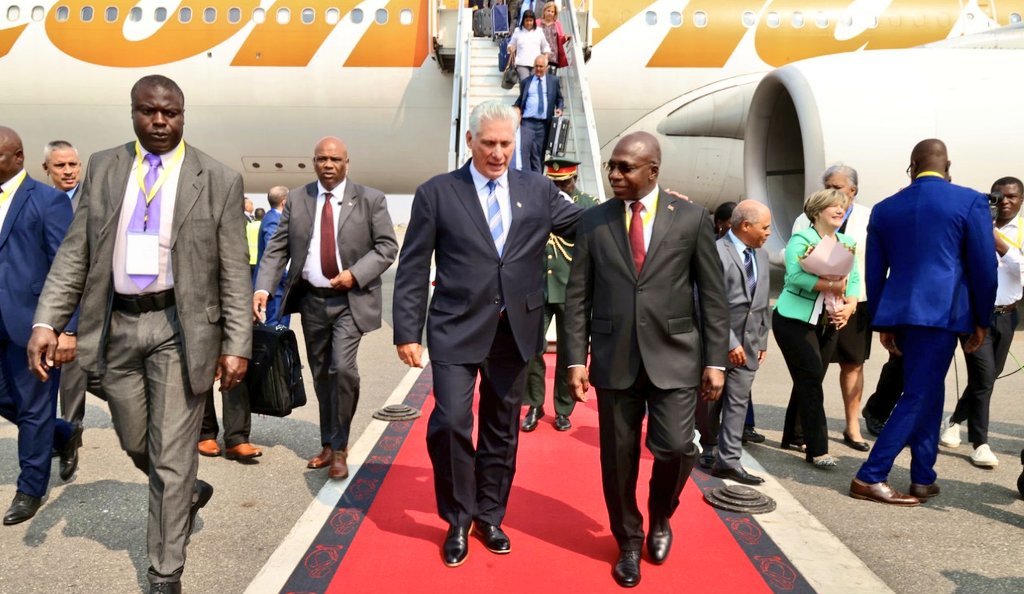
Cuban President
Miguel Díaz-Canel begins his official tour of
southern Africa in Angola, August 20, 2023.
Cuban President Miguel Díaz-Canel arrived in Angola on August 20 on an official visit, where he began a tour of southern Africa that included besides Angola, Mozambique, Namibia and South Africa. In South Africa, in his capacity as presiding chair of the Group of 77 + China and host of the Summit of that group to be held in Havana September 15 -16, he also participated in the BRICS Summit.
Díaz-Canel announced on X (Twitter), shortly before his departure from Cuba, that he was travelling to "our beloved Africa, to make official visits to Angola, Mozambique and Namibia, and to participate in the BRICS Summit to be held in South Africa. These are sister nations with which we are united by a history marked by solidarity at all costs."
Arriving in Angola, Díaz-Canel was received by President João Gonçalves Lourenço. They held discussions to outline strategies to jointly advance their countries and relations. Díaz-Canel also addressed the National Assembly (unicameral Congress), signed several agreements, paid Cuba's respects to Agostinho Neto, the founding father of Angola and close friend of Cuba, and met with representatives of broad sections of the Angolan people and Cubans living in Angola.
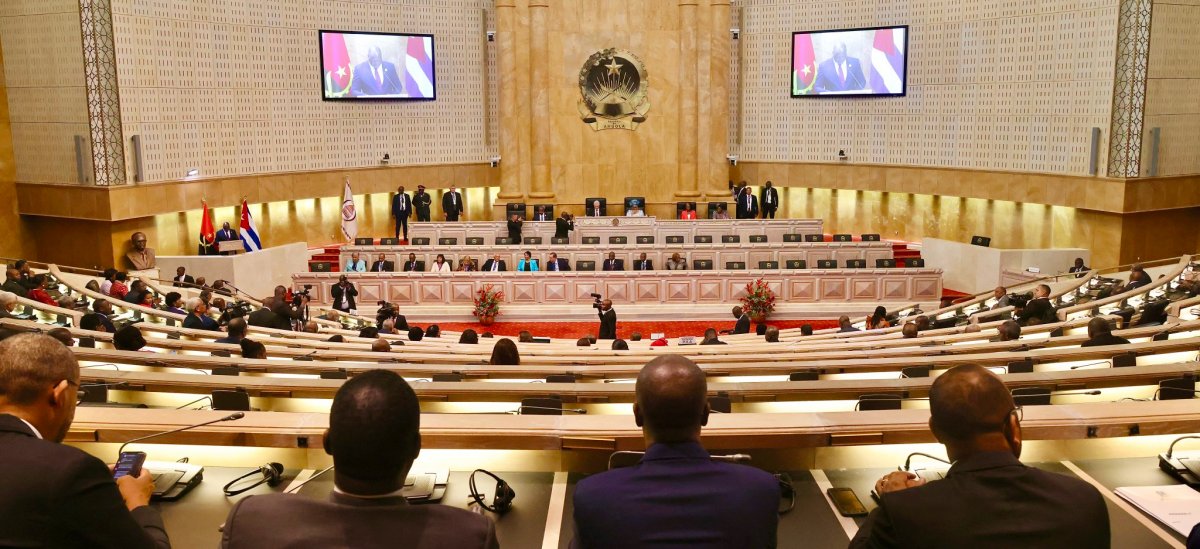
Diaz Canel is welcomed to
Angolan National Assembly, August 21, 2023
Relations with Angola are very close ever since Cuba played a crucial role in the common struggles to maintain Angolan independence and in the mutual support provided in difficult situations, as well as in the search for development. Since 1975, Cuba provided decisive support for the forces of the Government of the Popular Movement for the Liberation of Angola (MPLA), led by Agostinho Neto, in the preservation of independence. Cubans took part in that struggle together with the Angolans, with many giving their lives. Today more than 2,000 Cubans are rendering professional services in Angola, mainly in the health, higher education, defence, energy, industry, internal order and hydraulic resources sectors. Likewise, more than 9,800 Angolan students have graduated in Cuba.
The support of Fidel Castro Ruz for Angola, during its fight to expel apartheid South African troops, finally defeated in the great Battle of Cuito Cuanavale, and in more recent times in the medical field, is unsurpassed.
 Díaz-Canel
attended a ceremony dedicated to the memory of Dr. Agostinho Neto, the
centenary of whose birth was recently celebrated, at his memorial in
the Praça da República (Republic Square) in
Luanda.
Díaz-Canel recalled Neto's legacy as that of a singular
leader,
"who shows his
height as a revolutionary, intellectual and poet committed to the just
cause he defended under the red and black colors of the MPLA." On
behalf of the people of Cuba, Díaz-Canel placed a wreath as
tribute to Neto and toured the enclosure that keeps his remains. He
thanked President João Gonçalves
Lourenço, for his welcome, his words of affection towards
Cuba,
and for his hospitality. "We rejoice to note the great appreciation and
affection for Cuba in Angola, which we have felt continuously since our
arrival in this beloved land," he said. Díaz-Canel and
Lourenço
witnessed the signing of
three memorandums to expand economic cooperation.
Díaz-Canel
attended a ceremony dedicated to the memory of Dr. Agostinho Neto, the
centenary of whose birth was recently celebrated, at his memorial in
the Praça da República (Republic Square) in
Luanda.
Díaz-Canel recalled Neto's legacy as that of a singular
leader,
"who shows his
height as a revolutionary, intellectual and poet committed to the just
cause he defended under the red and black colors of the MPLA." On
behalf of the people of Cuba, Díaz-Canel placed a wreath as
tribute to Neto and toured the enclosure that keeps his remains. He
thanked President João Gonçalves
Lourenço, for his welcome, his words of affection towards
Cuba,
and for his hospitality. "We rejoice to note the great appreciation and
affection for Cuba in Angola, which we have felt continuously since our
arrival in this beloved land," he said. Díaz-Canel and
Lourenço
witnessed the signing of
three memorandums to expand economic cooperation.
Attending a session of the Council of Ministers of that country, he conveyed a warm greeting from Army General Raúl Castro Ruz to the Angolan people and Government. Díaz-Canel said it was an honour to address the members of the Angolan Parliament, whom he thanked on behalf of the Cuban people for their support for the demand to end to the economic blockade imposed on Cuba, and the parliamentary support for the strengthening of economic and cooperation ties.
The president also met with friends of Cuba from solidarity organizations and with Cubans living in Angola. Members of the Angolan League of Friendship and Solidarity with the Peoples, the Angola-Cuba Friendship Association, and the Association of Angolan pre-cadets and cadets all expressed their gratitude for Cuba's historic support to their country. Others who spoke at the meeting included members of the Angolan Trade Union Force, the International Youth Forum, and the National Union of Angolan Workers. Participants agreed on the condemnation of the U.S. blockade and all the coercive measures applied to Cuba. A representative of the Fidel Castro Ruz Middle Institute of Health argued that Cuba’s contributions to Africa and the world were unparalleled, and condemned the U.S. blockade of Cuba as a crime.
The African League, the Angolan Women's Organization and the Association of Graduates from Cuba, known as Los Caimaneros, highly applauded the work of Cubans in the training of young people in that country in the medical field. Meanwhile, the president of the Association of the Community of Cuban Residents in Angola, Felix Arozarena, assured Díaz-Canel that he can count on its members, united by the feeling of love for their families, their homeland and the defence of sovereignty.
 President Díaz-Canel
meets with Cuba's health and education collaborators in Angola.
President Díaz-Canel
meets with Cuba's health and education collaborators in Angola.
Despite the tight agenda of the official visit, Díaz-Canel said it was essential to meet with friends of Cuba and compatriots residing in Angola. He thanked them for the expressions of solidarity in the difficult times that the Caribbean nation has recently gone through, and for the affection they maintain towards it and their actions to safeguard it. He also expressed gratitude for the condemnation of the economic blockade and for confronting in social networks the campaigns of disinformation and misrepresentation about the Cuban reality. He mentioned that from October 25 to 27, the African Continental Meeting of Solidarity with Cuba will be held in the Caribbean nation, and on November 18 and 19, the fourth conference of The Nation and Emigration will take place. "We count on your success and on all those like you who are committed to the welfare and progress of the nation," he stressed.
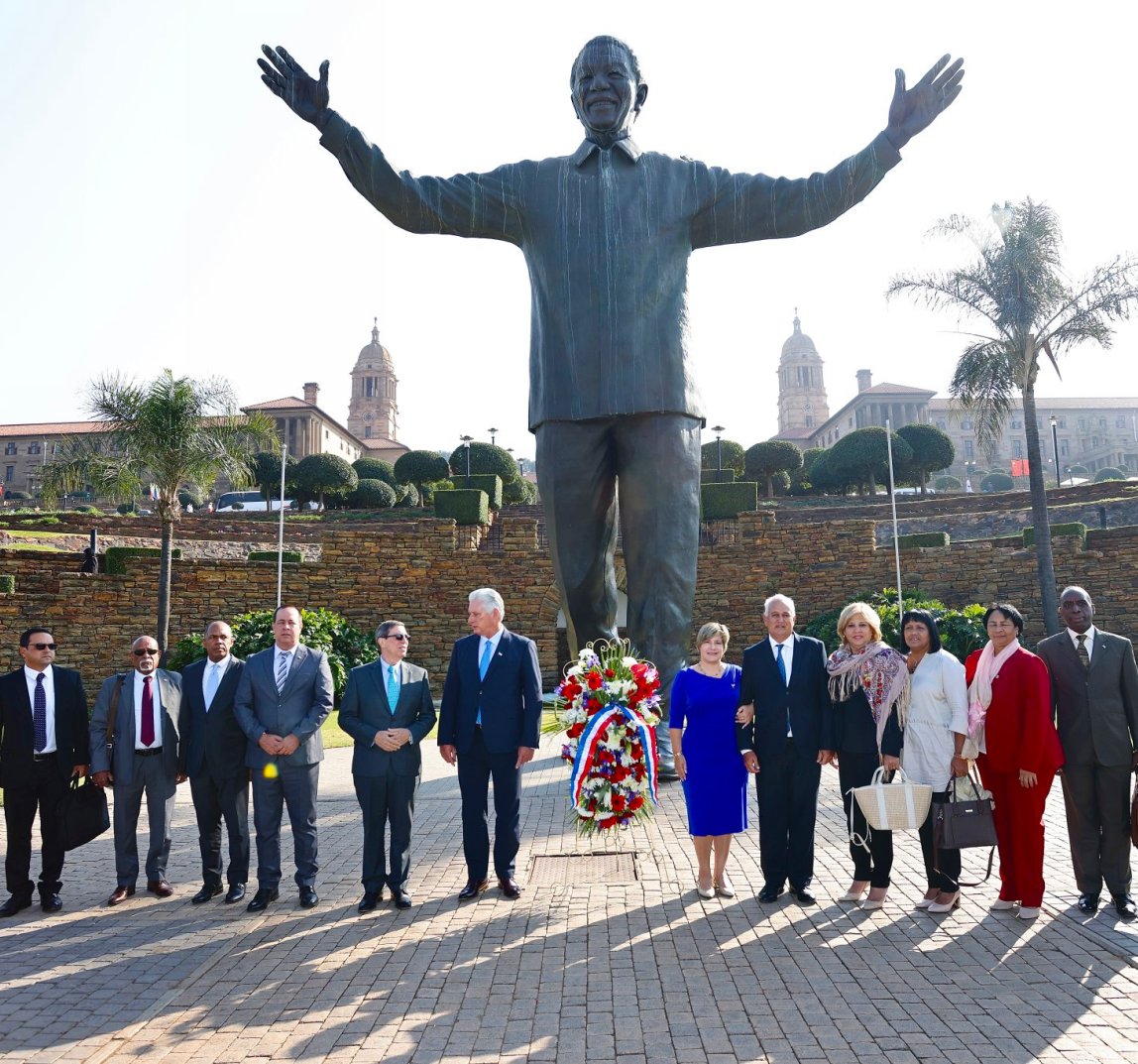 President
Díaz-Canel arrived in South Africa on August 22. "We are
already in the
homeland of our dear friend Nelson Mandela," he wrote after arriving in
South Africa and he recalled that Commander-in-Chief Fidel Castro Ruz
described Nelson Mandela as a brilliant and extraordinary leader,
symbol of the freedom of Africa and the world. The president also
recalled the feelings of brotherhood and solidarity that inspire
relations between South Africa and Cuba.
President
Díaz-Canel arrived in South Africa on August 22. "We are
already in the
homeland of our dear friend Nelson Mandela," he wrote after arriving in
South Africa and he recalled that Commander-in-Chief Fidel Castro Ruz
described Nelson Mandela as a brilliant and extraordinary leader,
symbol of the freedom of Africa and the world. The president also
recalled the feelings of brotherhood and solidarity that inspire
relations between South Africa and Cuba.
Accompanying the Cuban President were Bruno Rodríguez, Minister of Foreign Affairs; José Ángel Portal Miranda, Minister of Public Health, and Emilio Lozada, head of the Department of International Relations of the Central Committee of the Communist Party of Cuba (PCC), among other officials.
The President attended the BRICS Summit on August 24, participating as a guest in his capacity as pro tempore president of the G77+China. In this capacity, he gave a speech in which he described as a great honor and privilege his presence in the conference of an organization that creates great expectations and hopes in the strengthening of the currently urgent and essential multilateralism. "If we do not act at once, we will bequeath our children and grandchildren a planet not only unrecognizable for those of us who come from the previous century, but also, and sadly, doomed to be uninhabitable," he said. For the full text of his speech, click here.
Díaz-Canel also held meetings with several leaders from different countries attending the Summit of the BRICS bloc. Between sessions, Díaz-Canel met with Azali Assoumani, President of the Comoros and the African Union. Both leaders addressed bilateral relations between their countries. Díaz-Canel extended Assoumani an invitation to participate at the G-77 Summit in Havana. He also met Dilma Rousseff, president of the BRICS Bank, on the possibility to implement joint projects. He also met with India's Prime Minister Narendra Modi whom he thanked for the credit lines granted by India to Cuba to develop renewable energy and rice cultivation.
A high point of his visit to South Africa was the jam-packed solidarity rally held on the morning of August 23. The militant and joyful rally was organized by the African National Congress (ANC), the Congress of South African Trade Unions and the South African Communist Party to express their support for Cuba and the demand that the U.S. blockade of Cuba be ended. The rally took place at Freedom Park, Tshwane, with the venue filled to capacity. It was addressed by President Díaz-Canel and ANC Secretary General Fikile Mbalula.
Mbalula expressed the deep appreciation of the people of South Africa for Cuba's unwavering support which played a decisive role in ending apartheid. He said, "We will never forget the ultimate sacrifice by Cubans in the Battle of Cuito Cuanavale in Angola which led to the historic defeat of the apartheid armed forces." Referring to Cuba's training of thousands of doctors from South Africa and many other countries, he added, "To us in South Africa and the countries of the global South, Cuba is synonymous with profound acts of solidarity!"
On behalf of the ANC he reiterated the pledge of unequivocal solidarity with the people of Cuba against the unjust U.S. blockade, demanded the removal of Cuba from the list of terrorist sponsoring states, and urged South Africans to join the worldwide million signature campaign on the removal of the blockade.
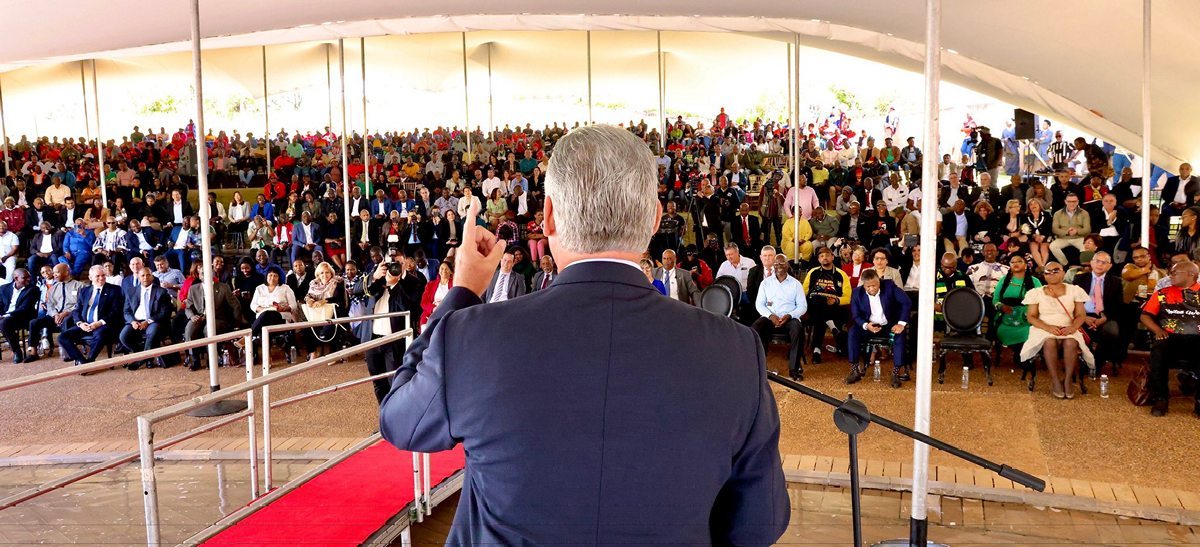 Cuban President
Díaz-Canel addressing the solidarity rally
Cuban President
Díaz-Canel addressing the solidarity rally
Díaz-Canel paid tribute to Nelson Mandela and to the Cuban heroes who fell in the struggle for the liberation of South Africa. He thanked the South African authorities and people for taking care of the Cuban doctors and health workers who have been working in their country for more than 20 years. He said, "In the name of those who fell for the freedom and sovereignty of Africa, South Africa and Cuba and for peace and harmony among nations and human beings, let us fight for friendship to become indestructible and for future generations of South Africans and Cubans to be proud of the bonds that we bequeath to them."
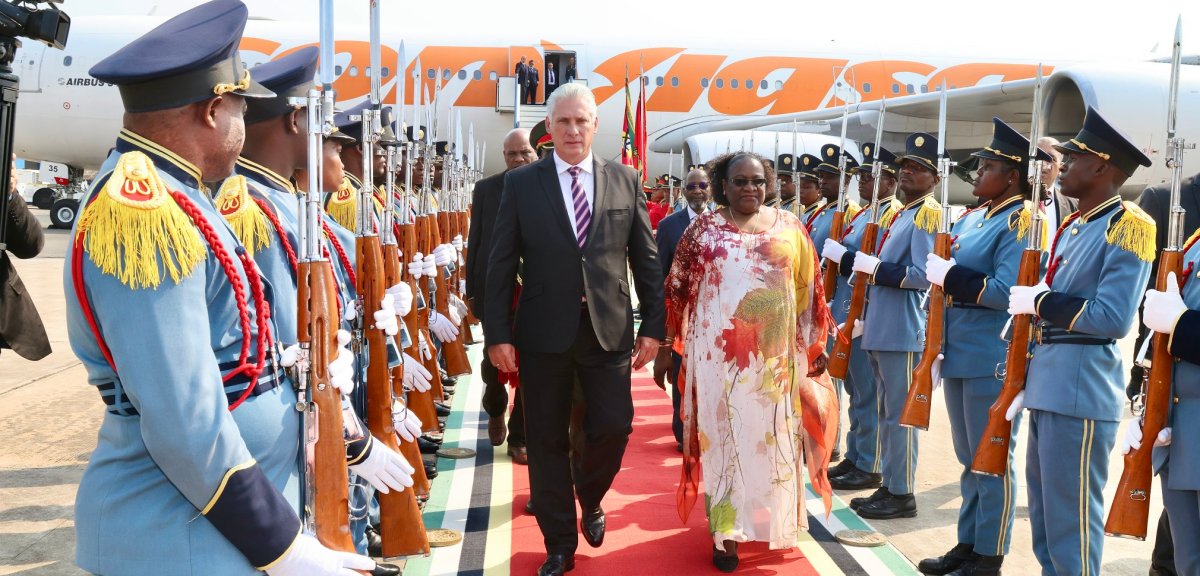
President
Díaz-Canel arrives in Mozambique, August 25, 2023.
The next stop for Díaz-Canel was Mozambique on August 25 where he was officially received by his Mozambican counterpart, Felipe Nyussi, at the Presidency of the Republic, where both leaders held a private meeting. During their talks, Nyussi confirmed the Cuban President's invitation to travel to Havana in September to participate in the Summit of the G77+China. Díaz-Canel recalled that August 27th marks the 48th anniversary of bilateral relations between the two countries.
Díaz-Canel concluded his tour in Namibia where he was the guest of honour at the ceremony on Heroes' Day. Paying tribute to heroes and heroines of Namibia, Angola and Cuba, he said they "paved the way to independence with their blood, and ended the apartheid regime." He also received, from the hands of his Namibian counterpart, the "Order of the Most Ancient Welwitschia Mirabilis," Namibia's highest decoration. Bilateral agreements were signed to strengthen mutual ties.
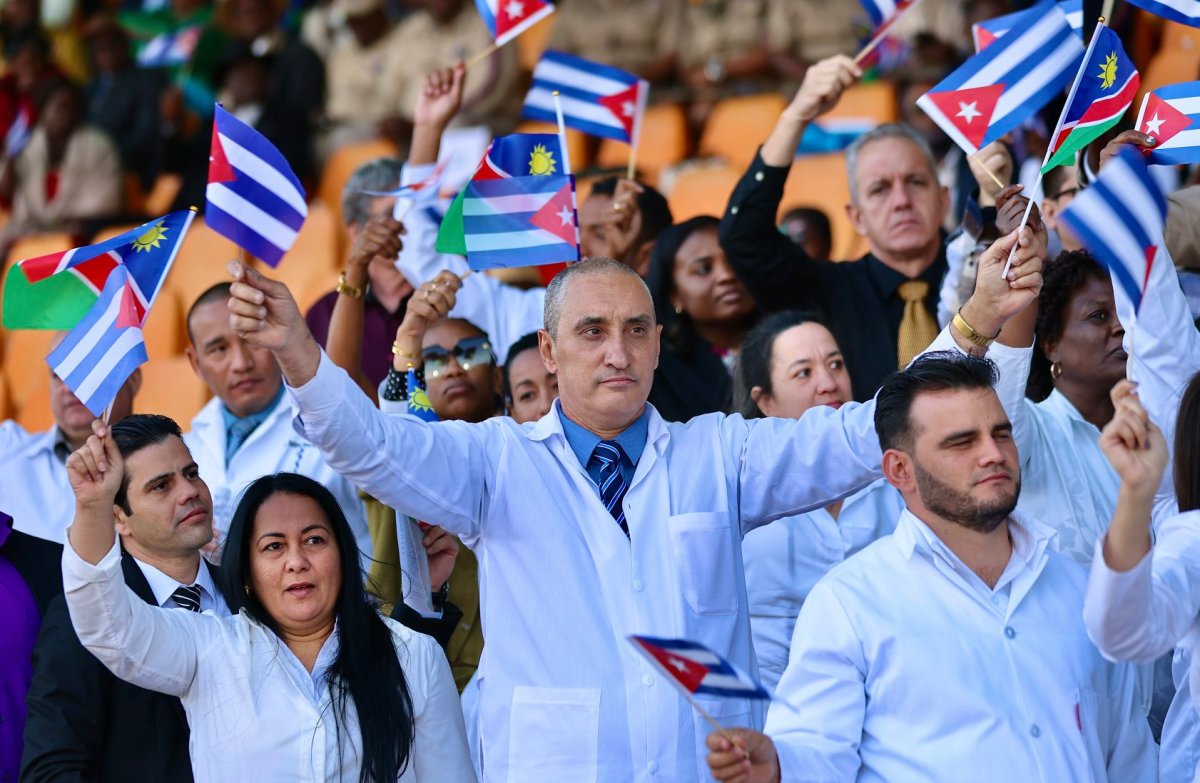
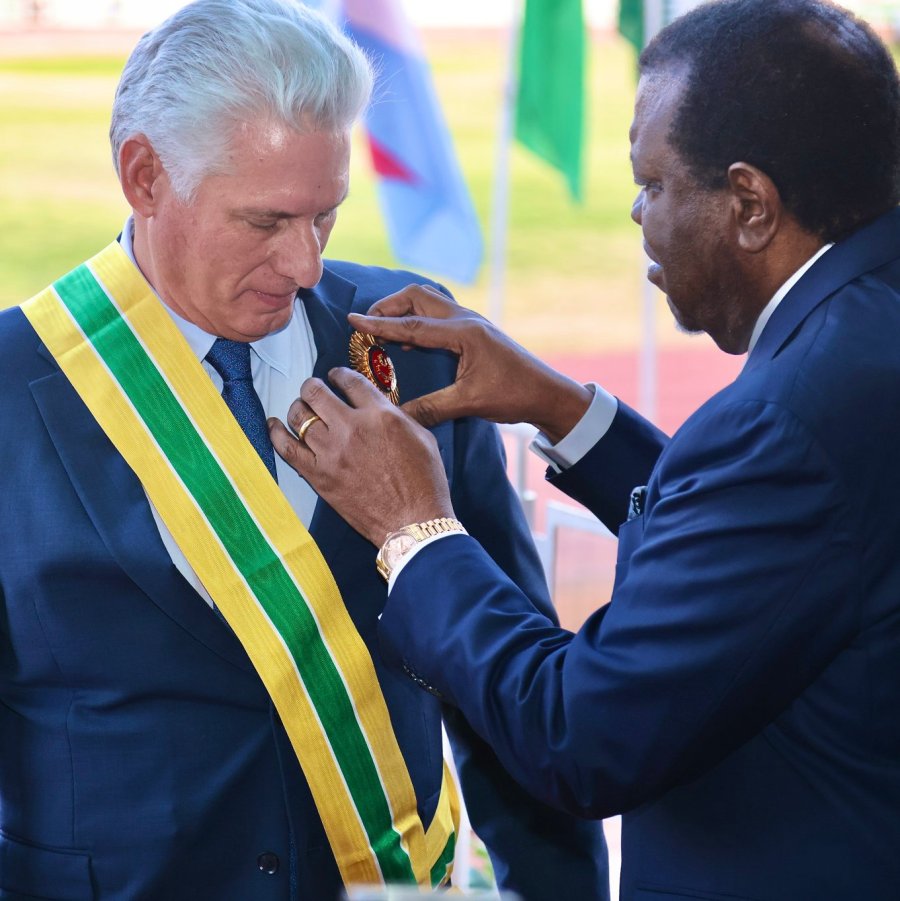
President
Díaz-Canel was a guest of honour at a Heroes' Day
ceremony in Namibia, August 26, 2023
(Photos: Cuban Presidency)
Worldwide Campaign for One
Million Signatures
to
Remove Cuba from U.S. List of State
Sponsors of Terrorism
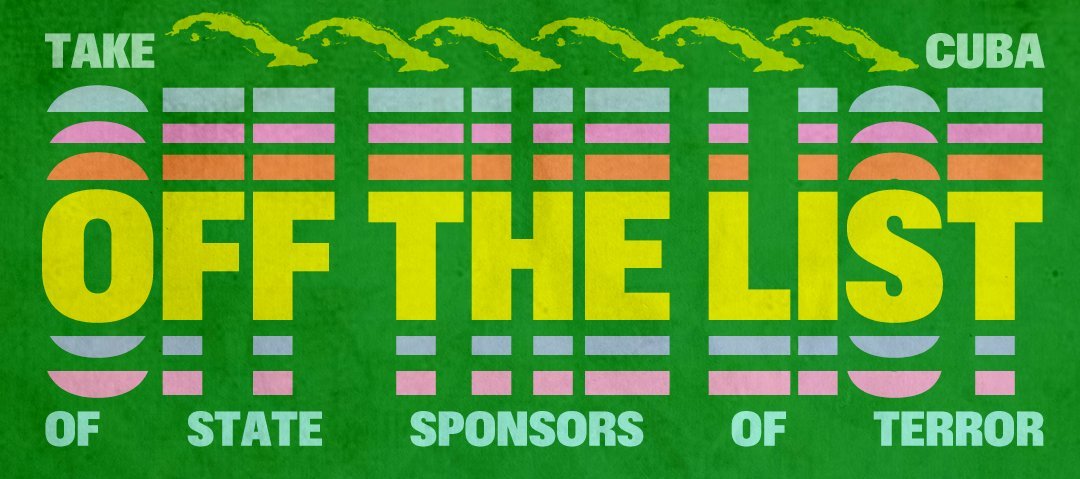
Artists, intellectuals, political leaders, people's movements, trade unions, and political parties from around the world have joined together in a historic campaign to call on U.S. President Joe Biden to remove Cuba from his country's so-called state sponsors of terrorism list.
The convening organizations of this campaign, the International Peoples' Assembly (IPA), ALBA Movimientos, Foro de São Paulo, Trade Union Confederation of the Americas, Jornada Continental por la Democracia y Contra el Neoliberalismo, World March of Women, Continental Latin American and Caribbean Network in Solidarity with Cuba, and La Vía Campesina, seek to collect more than one million signatures on a letter addressed to Biden asking that Cuba be removed from the List of State Sponsors of Terrorism. The letter will be delivered to Biden on the occasion of Human Rights Day, which is celebrated on December 10.
The letter states that Cuba's inclusion on the list, "makes it much harder for Cuba to make transactions using international banking systems and acquire necessary goods on the international market, such as fuel, food, construction supplies, hygiene products, and medicine."
Chico Buarque, renowned Brazilian musician, Citlalli Hernandez, Senator and Secretary General of the Mexican MORENA party, Peter Mertens, President of the Belgian Workers' Party, Judith Butler, feminist scholar, and Evo Morales, former Bolivian President, have already added their signatures to the campaign.
Ernesto Samper, former Colombian president, and one of the signatories of the campaign declared: "Biden must take Cuba off the list, because Biden understood with President Obama that unilateral sanctions at the international level are illegal, immoral, and inhumane and that is why they initiated a historic process of normalization of relations between the two countries that could have been the beginning of the end of the blockade."
To learn more, visit LetCubaLive.info campaign website, which contains all the information on the process.
(International Peoples' Assembly, August 11, 2023)
Hands
Off Haiti!
Kenyan Delegation Visits Haiti to Prepare for Foreign Intervention Force
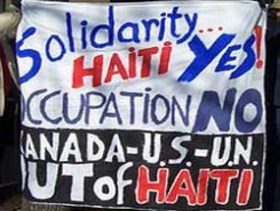 A
Kenyan "security delegation" visited Haiti from August 20 to 23
on a so-called assessment mission intended to clear the path
for
Kenya to lead la foreign interventionist force at the behest of the
U.S. and the "Core Group" against Haiti. France and Canada are heavily
involved in this "Core Group" along with the U.S. private interests
which operate in Haiti. The intervention of a Kenyan military or police
mission is said to be contingent on a UN Security Council mandate being
obtained.
A
Kenyan "security delegation" visited Haiti from August 20 to 23
on a so-called assessment mission intended to clear the path
for
Kenya to lead la foreign interventionist force at the behest of the
U.S. and the "Core Group" against Haiti. France and Canada are heavily
involved in this "Core Group" along with the U.S. private interests
which operate in Haiti. The intervention of a Kenyan military or police
mission is said to be contingent on a UN Security Council mandate being
obtained.
The mission of the foreign intervention force to be headed by Kenya is
ostensibly to control violent gangs and strengthen the capacities of
the Haitian National Police (PNH) which is a known corrupt body. In
fact its purpose is to suppress the resistance of the Haitian people
and maintain the rule of the Haitian oligarchs, currently headed by the
illegitimate Ariel Henry regime, on behalf of narrow private interests
based in the U.S., Canada, France and elsewhere.
It is telling that the 10-person delegation arrived aboard the regular
American Airlines flight (AA 819) not from Kenya, but from the United
States. It was greeted at the international airport by members of the
Henry regime. The Kenyan delegation met with Prime Minister Henry,
members of his "government," his three-member appointed "High Council
for Transition" and members of the high command of the PNH.
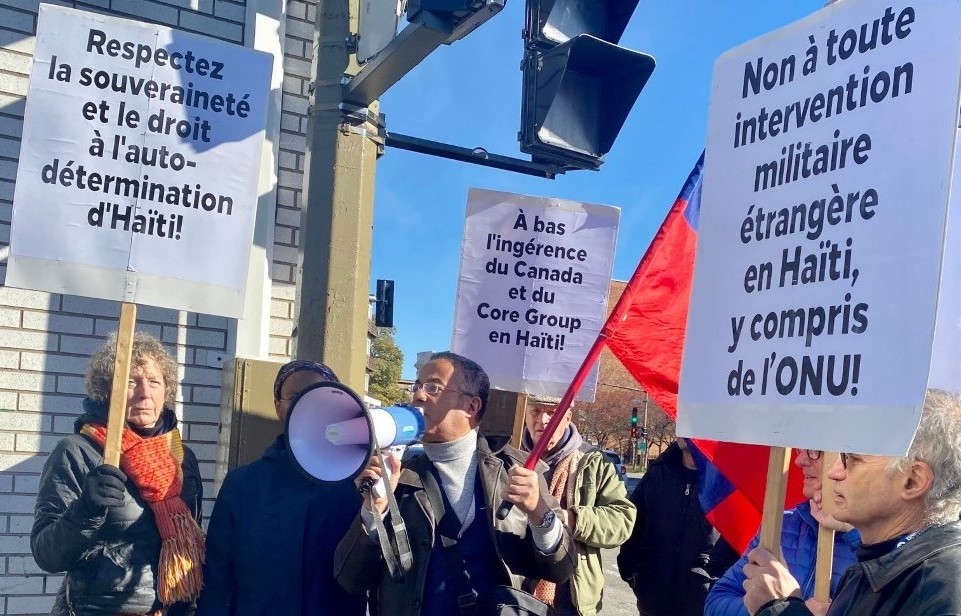 Their main task during the three-day visit was to
collaborate with the high command of the PNH in developing a "security
plan" for their interventionist mission, a plan which was in fact
already prepared by the police with U.S. and Canadian police
in command. The
plan originally called for a 1,000-strong force. However, during their
visit, Kenyan officials claimed that they would need a minimum
threshold of 2,000 officers who are ready to be deployed and they would
need a resolution from the UN Security Council (UNSC), which the U.S.
had said it would write. The delegation also proposed a "static
protection force" aimed at protecting “strategic
infrastructure” like the seaport, airport and police academy.
Their main task during the three-day visit was to
collaborate with the high command of the PNH in developing a "security
plan" for their interventionist mission, a plan which was in fact
already prepared by the police with U.S. and Canadian police
in command. The
plan originally called for a 1,000-strong force. However, during their
visit, Kenyan officials claimed that they would need a minimum
threshold of 2,000 officers who are ready to be deployed and they would
need a resolution from the UN Security Council (UNSC), which the U.S.
had said it would write. The delegation also proposed a "static
protection force" aimed at protecting “strategic
infrastructure” like the seaport, airport and police academy.
Kenya’s Foreign Minister Alfred N. Mutua was quoted by the New
York Times on September 5 as saying, "It's not a matter of
whether we are going to Haiti or not -- we are going. We are
convinced." He said he hoped the Kenyan officers would deploy to Haiti
by the end of the year. Mutua claims Kenya is partly inspired
to take up this mission by Pan-African unity toward the descendants of
the enslaved African peoples who liberated themselves from French
rule. Words are cheap. It is the other part which Haitians are
worried about -- that this intervention has the aim of cementing
foreign rule over Haiti at a time the oppression of the Haitian people
by foreign interference and domination is already intolerable.
No amount of protocol, attempts to claim a UN mandate for a
non-UN
military or police intervention or high ideals makes this mission
legitimate.
Vietnam's National Day
78th Anniversary of Victory of August Revolution
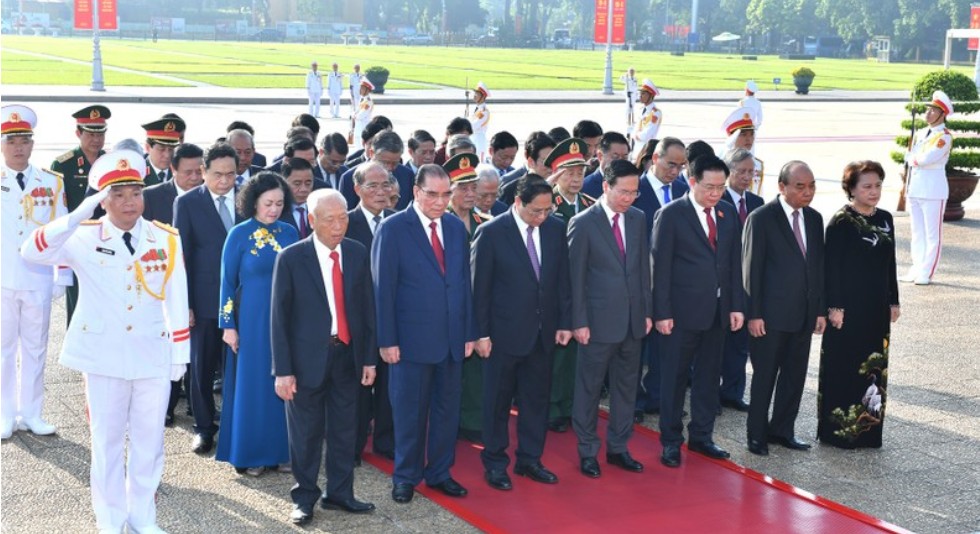
Vietnamese
President Vo Van Thuong, Prime Minister Pham Minh Chinh, National
Assembly Chairman Vuong Dinh Hue and other dignitaries pay tribute to
Ho Chi Minh, August 31, 2023.
September 2 is Vietnam's National Day. It was on this day in 1945 that Ho Chi Minh, founder and leader of the Communist Party of Vietnam and father of the modern Vietnam, crowned the Victory of the August Revolution by declaring Vietnam a sovereign and independent nation.
This year is the 78th anniversary of these momentous events.
In Vietnam, the Victory of
the August Revolution and Vietnam's National Day are being joyously
celebrated with art
exhibits, film festivals, cultural events large and small, including a
gala held in Hanoi on
August 31 at which President Vo Van Thuong delivered a speech hailing
the confident strides
with which Vietnam continues on the path of national independence and
socialism, for global
peace, friendship, cooperation and development.
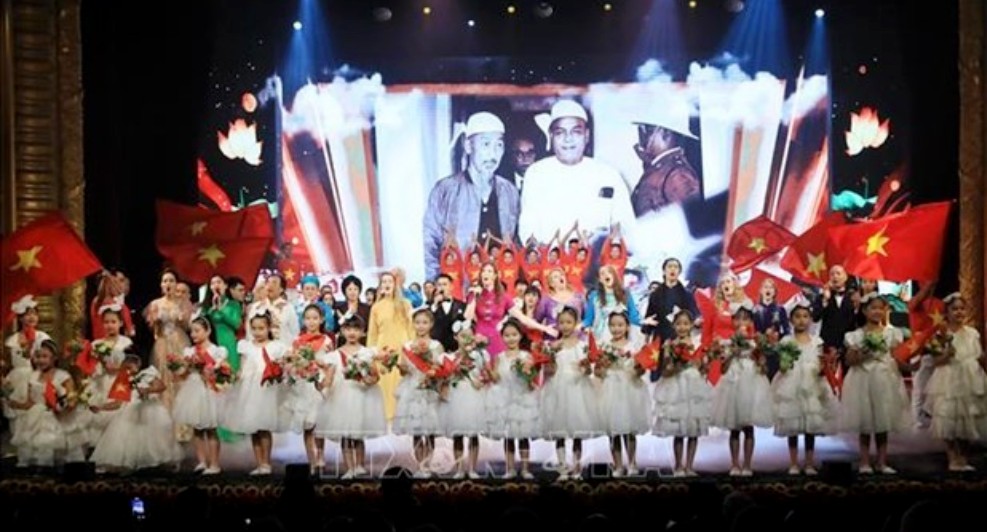
In Canada, the Canada Vietnam Friendship Society hosted a webinar to celebrate these anniversaries, as well as to mark 50 years of formal diplomatic relations between Canada and the Socialist Republic of Vietnam. Canada established diplomatic relations with Vietnam in 1973 and opened an Embassy in Hanoi in 1994.
The August Revolution was an event of great significance both for the Vietnamese nation and for the liberation struggles of the peoples of the world. Under the leadership of the Communist Party of Vietnam with Ho Chi Minh at the head, the Vietnamese people rose up as one to topple the colonial and feudal regimes, seize power, and establish the first people's democratic country in Southeast Asia, the Democratic Republic of Vietnam.
Nhan Dan, the newspaper of the Central Committee of the Communist Party of Vietnam published an editorial on August 18 on the significance of the August Revolution. Titled "The Great Value of August Revolution Lives Forever with the Nation," the editorial points out that the victory of the August Revolution liberated Vietnam from the yoke of centuries of foreign domination, French colonial subjugation and Japanese militarist occupation. The declaration of Vietnam's sovereignty and independence on September 2, 1945, marked a significant milestone in the struggle for national construction and defence. Since then, Nhan Dan writes, "the Vietnamese people have entered a new period of national independence associated with socialism. Our people are the masters of the country, and are united in the shared mission of building and defending the country."
"The revolution is also significant as a major international contemporary event which has inspired oppressed peoples of the world to rise up for independence, democracy, and social progress," Nhan Dan points out.
The Vietnamese people are forever proud of the achievements of the August Revolution as it is the crystallization of passionate patriotism, wisdom, and the unwavering spirit of the nation, which has been promoted to new heights under the leadership of the Party and Uncle Ho, Nhan Dan writes.
The Party and the people of Vietnam continue to this day to be inspired by the lessons of the August Revolution: lessons on Party-building, on mobilizing and promoting the great national solidarity, of self-reliance to "liberate ourselves with our own strength," and of "combining national strength with the strength of the time" to achieve victory in their ongoing nation-building project.
Nhan Dan concludes: "The country is now in a new development stage, with the spirit of the August Revolution acting as a fire motivating the entire Party, people, and armed forces to overcome all difficulties and challenges and seize every opportunity to achieve even greater victories in the renovation period, thus building a wealthier and more beautiful country with rapid and sustainable development."
On this occasion of the 78th anniversary of the Victory of the August Revolution and of Vietnam's National Day, the Communist Party of Canada (Marxist-Leninist) extends its heartfelt revolutionary greetings to the Communist Party of Vietnam, to the Socialist Republic of Vietnam and to the Vietnamese people at home and abroad, including the hundreds of thousands of Vietnamese who today call Canada home.
(Photos: Nhan Dan)
Confident Strides on Path of National Independence and Socialism for Global Peace, Friendship, Cooperation and Development
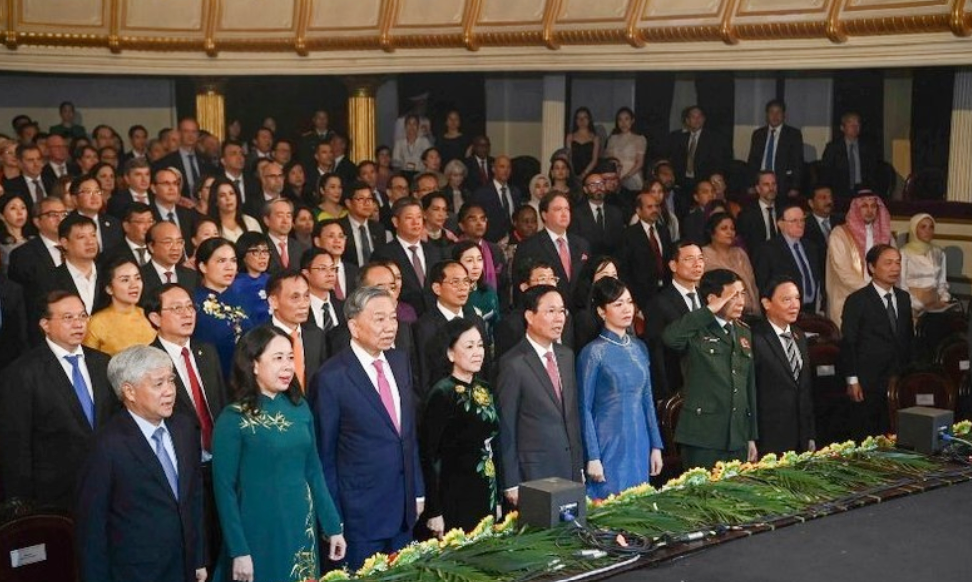
President Vo Van
Thuong
and other delegates at flag raising ceremony
during Vietnam's National Day celebrations, August 31, 2023.
On August 31, Vietnam's President Vo Van Thuong and his spouse hosted a ceremony in Hanoi marking the 78th National Day of Vietnam (September 2, 1945-2023). The president spoke with great pride of the Vietnamese people's achievement under the leadership of the Communist Party of Vietnam in winning national liberation, sovereignty and independence. Addressing leaders of the Communist Party, state, and Fatherland Front of Vietnam as well as assembled diplomatic guests, his remarks, titled "Confident Strides on the Path of National Independence and Socialism for Global Peace, Friendship, Cooperation and Development" expressed well the lofty nation-building project of the Vietnamese people and the proletarian internationalist outlook of the Party and state.
President Vo Van Thuong began by saying: "The victory of the 1945 August Revolution is one of the most glorious chapters in the history of Vietnam. It underscores the remarkable strength of the great national unity, and ushered in a quantum leap for the Vietnamese nation – an era of national independence aligned with socialism." He reflected on the solemn words of President Ho Chi Minh in proclaiming the birth of the Democratic Republic of Vietnam, now the Socialist Republic of Vietnam, on September 2, 1945, when he announced to the world: "Vietnam has the right to enjoy its freedom and independence and it has, in fact, become a free and independent country. The entire people of Vietnam are determined to mobilize all their physical and mental strength, to sacrifice their lives and properties to safeguard the said freedom and independence."
Nothing is more precious than independence and freedom, President Vo Van Thuong said.
The president noted that from a country that had yet to make itself known on the global stage, "Vietnam has now established diplomatic ties with 192 countries. It has emerged as one of the most dynamic economies in the Asia-Pacific, and affirmed its role as an important part of numerous economic linkages, free trade agreements, and production chains in the region and the world. Vietnam is indeed a country of peace, friendship, cooperation, and development, and a beautiful, safe, friendly, and hospitable destination."
The president hailed the people's patriotism, great national unity, unwavering resolve and bravery, relentless pursuit of self-reliance and resilience, and burning aspiration for independence, freedom, peace, and happiness as an invaluable asset and significant source of strength for Vietnam to overcome all challenges.
Vietnam, he said, is striving to fulfill the aspiration to become a developed, high-income country by 2045. To this end, he continued, "we remain steadfast in promoting the holistic and comprehensive implementation of Doi Moi (renovation) and engaging in extensive and comprehensive international integration. Vietnam also continues to improve as a socialist law-governed state and a socialist-oriented market economy."
President Vo Van Thuong stressed that in the international arena, "Vietnam has always conducted a consistent foreign policy of independence, self-reliance, diversification and multilateralization of external relations. Vietnam is a friend, a reliable partner, and a responsible member of the international community for peace, stability, cooperation and development worldwide."
"Vietnam has successfully assumed numerous positions at multilateral forums, and joined hands in realizing the goals of promoting development, protecting human rights, and contributing to the maintenance of global peace. Vietnam's efforts have earned the recognition and affection from international friends."
"On the occasion of Vietnam's momentous celebration, on behalf of the Party, state and people of Vietnam, I would like to once again extend my sincere gratitude to friends, partners, and the progressive people worldwide for having stood with Vietnam and offered us your affection, trust, and invaluable support and friendship over the past 78 years."
Turning to current conditions, President Vo Van Thuong reiterated Vietnam's commitments to peace, friendship, cooperation and development."We are living in a world of uncertainties and complexities, wherein countries are facing greater risks and challenges. Global, traditional, and non-traditional security issues continue to evolve in a complicated manner, and threaten stability and sustainable development. Conflicts and divisions are still occurring in many regions. Geo-political tensions continue to escalate. Multilateralism and international law are confronted with various challenges."
"For common peace and prosperity for all countries to be maintained, Vietnam is of the view that we need to stand united, bolster cooperation, uphold multilateralism, and observe the UN Charter and international law. Vietnam stands ready to serve as a bridge to facilitate cooperation and dialogue, reinforce multilateralism, and promote peaceful settlement of disputes based on the UN Charter and international law. Vietnam shall always remain a close and loyal friend, a reliable partner, and a responsible member of the international community."
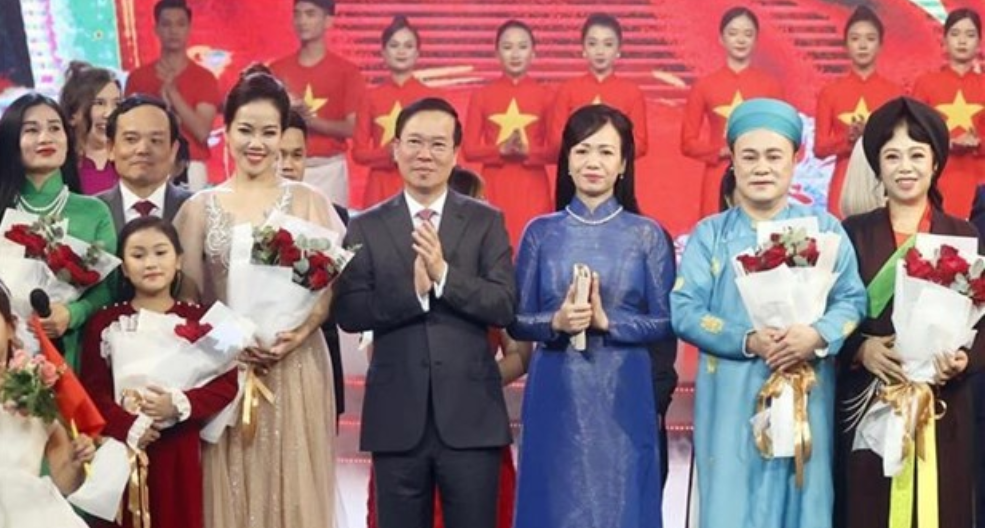
President Vo Van Thuong
and his wife at National Day celebration, August 31, 2023.
(Photos: Nhan Dan)
(To access articles individually click on the black headline.)
Website: www.cpcml.ca Email: editor@cpcml.ca



